#1827 minisode
Text
Good Omens S2 Concept art by Jim McCarthy
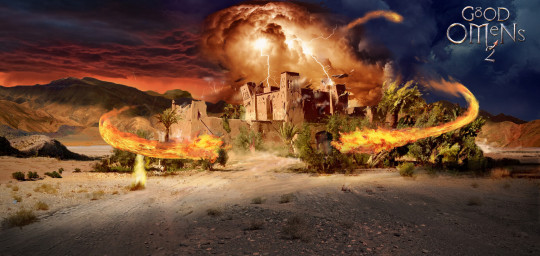
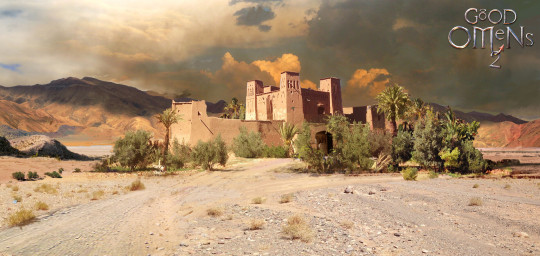
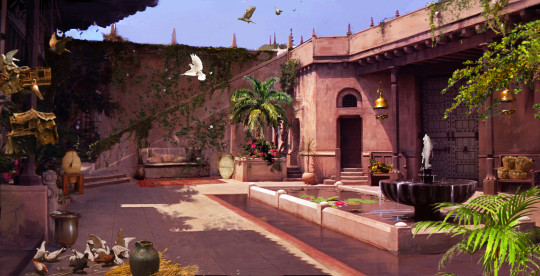
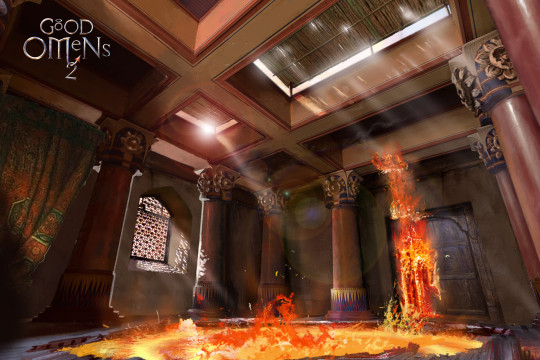
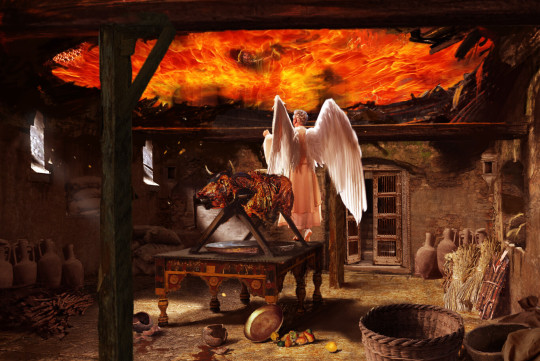
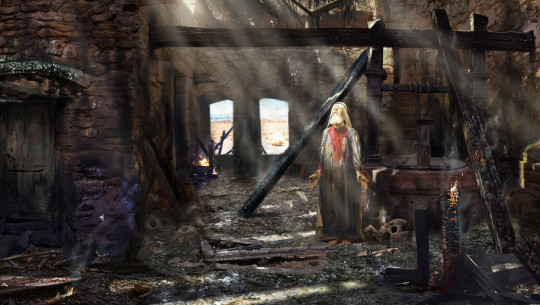
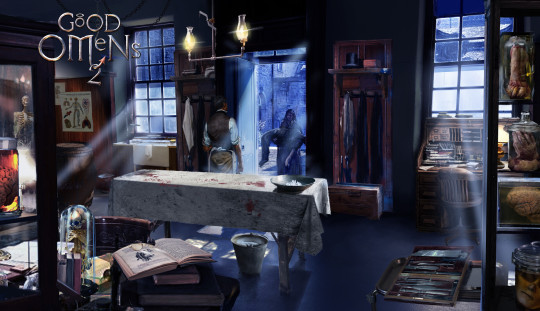
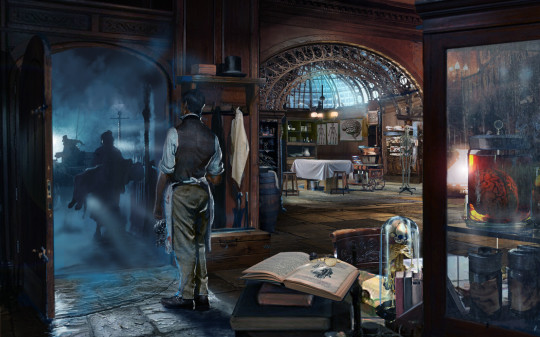
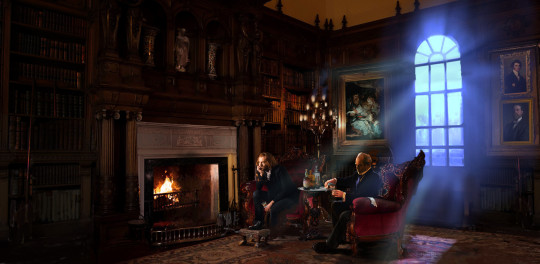
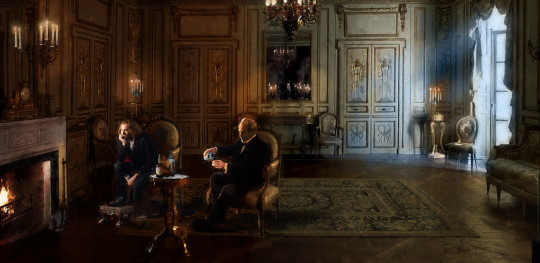
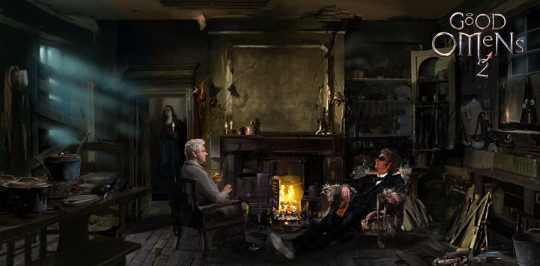
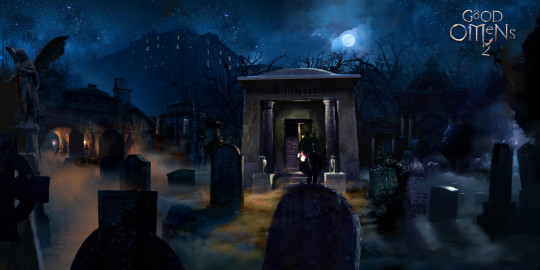
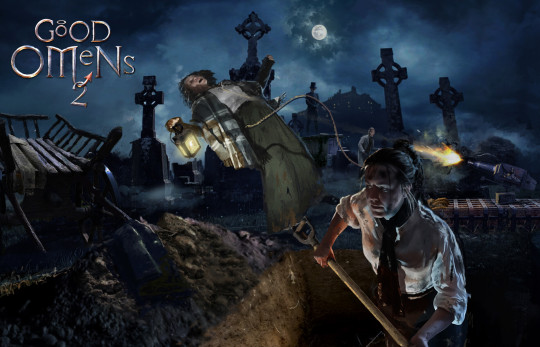
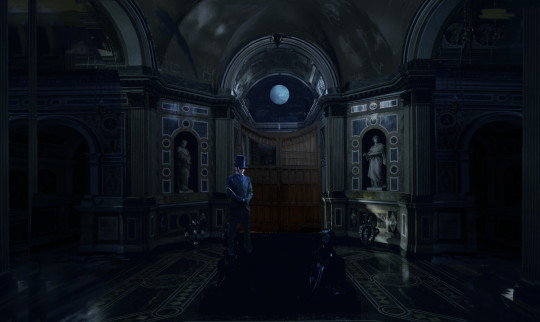
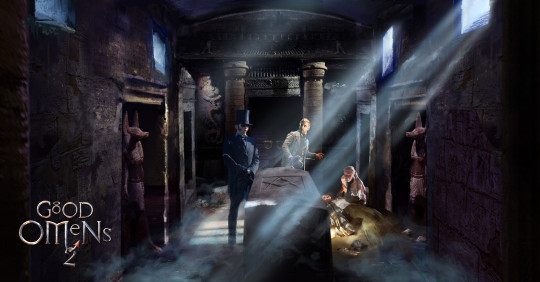
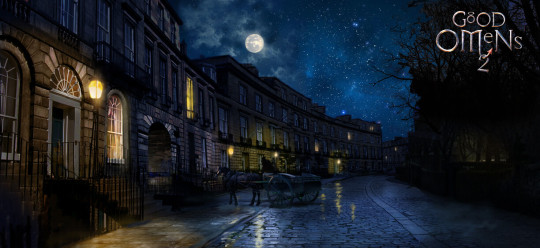
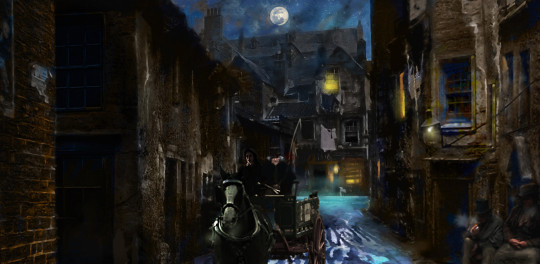
(from)
#good omens#gos2#season 2#photos#concept art#jim mccarthy#2ep2#2ep3#job's minisode#1827 minisode#bts
2K notes
·
View notes
Text
Writers Guild Presents:
"Stunning View"
by LaudaddySmitten
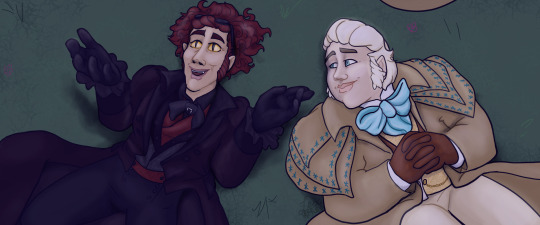
Ineffable May day 16: "1827"
Ch 1: Hell's Graveyard Shift Is Run by Interns
Summary
When Hell fails to notice Crowley’s Very Good Deed, he is left in an Edinburgh graveyard trying to navigate a world tilted by laudanum. Fortunately for him, Aziraphale has no intention of leaving him to fend for himself. Fortunately for both of them, Crowley's compromised brain-to-mouth filter leads to a far more enjoyable evening than they expect.
Crowley stared at Aziraphale through a long, drunken pause during which his brain's temporal lobe made an admirable effort to process Aziraphale's words. It was mostly unsuccessful, but it could hardly be blamed for the visual cortex hogging all of Crowley's attention.
“You're so lovely!” He loudly blurted out with a toothy grin, before continuing. “You're like…glowy. Twinkly? No, 'bright’, probably. Oh I know the word- beautiful! You're beautiful. Beautiful Angel. Oh! And when you smile like that it's even better!”
CW/TW: Canon-typical substance use (but NO dub con); Rated Explicit (eventual smut)
Continue reading on AO3:
This baby is chock full of: fluff and humor, fluff and science, romantic fluff, fluff and science and smut, fluff and smut, & fluff and science smut. (Yes I mean what I said.) 😉🔭🥰 🧬🔥
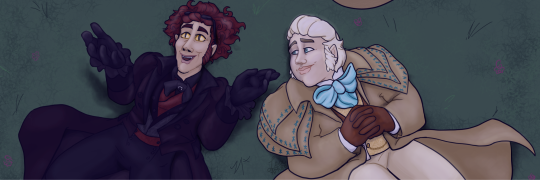
Art banner (here's the uncropped version ^) by the amazing @lexarturo - thank you so much, it turned out so perfect!
Thanks to my most longstanding (and long-suffering) beta reader: @olfactoryventriloquism
And the @goodomensafterdark Writers Guild for all the support and even more betas:
@outrageousring5655 @happynachohologram
Astrophysics beta (yes, I really needed one of those, and yes, she's just the person): @nosferatini
And many others who read at least chapter 1 for me and gave great advice! @fishey-me @kotias @southernfriedamy @sixbynine-da @ghst-signal @foamfollowerisfallen @unapologetic-apathy
Also thanks to @bea-n-art for creating this Laudaddy portrait I've been obsessed with and inspired by since she made it. It's kept me motivated to write.
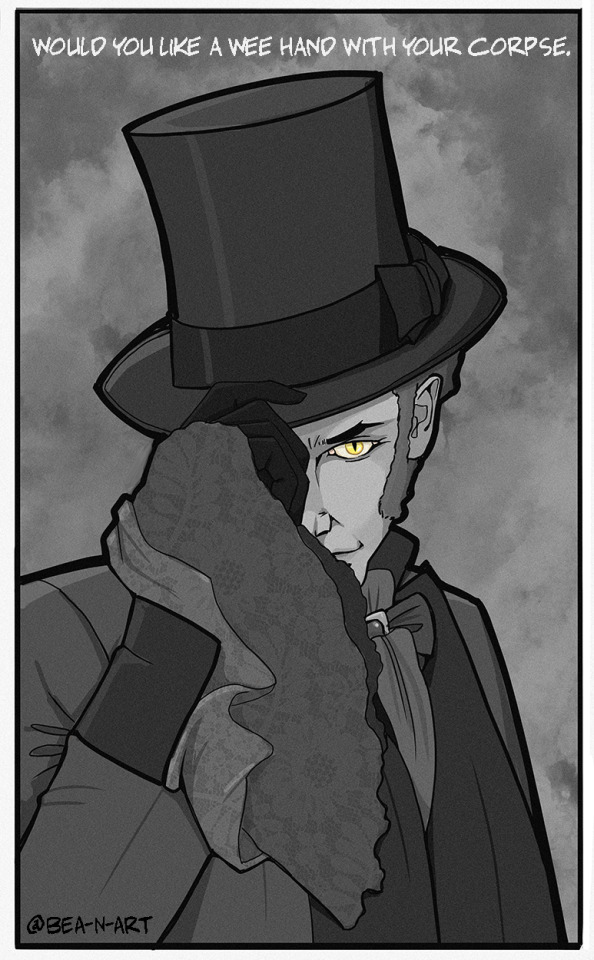
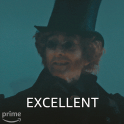
#Stunning View#good omens after dark#romance happens after dark too#in fact this whole fic happens After Dark#science always belongs in fanfiction#ineffable may 2024#good omens minisode#the resurrectionists#laudaddy#off my head on laudaddy#good omens#ineffable husbands#ineffable idiots#anthony j crowley#good omens aziraphale#good omens crowley#aziraphale crowley#good omens fanart#az fell#dr mcfell#good omens 1827#1827#1827 crowley#1827 aziraphale#aziracrow#good omens fanfic#my posts#my fanfiction
126 notes
·
View notes
Text

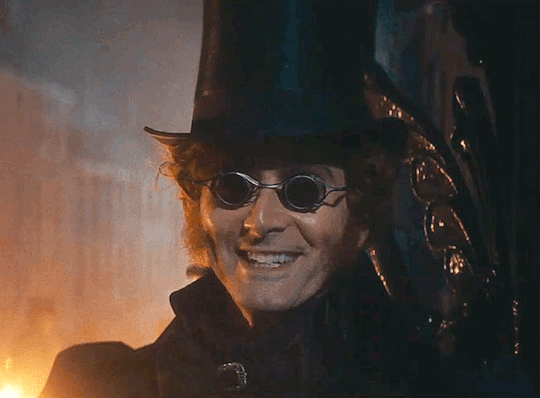
"Oh, she absolutely did."
Good Omens S2/Ep3
#i just needed a smiling Crowley for my dash today ok?#maybe you do too#crowley#good omens#crowley gif#good omens gif#goodomensgif#1827#the resurrectionists#the resurrectionists minisode#crowley good omens#1827 crowley#i just can't get over how smiley he is in this minisode#and the 1827 looks absolutely makes me weak#a duck gifs#should i make these a series?#good omens s2#good omens 2#gos2
150 notes
·
View notes
Text
I just remembered that I fucking love Gentleman Jack and that I haven’t watched it in like 4 years or smth so i watched an episode and now I’m obsessed with the idea of Anne and Ann running into Crowley and Aziraphale and being like “Damn, ur gay too? Slaying.” Anyway, I drew it

I love gay people.
#digital art#digital doodle#good omens season 2#good omens#crossover#gentleman jack#anne lister#ann walker#gay people#they’re so gay#and so fruity#i understand that#gentleman jack takes place in 1834#and the body snatching minisode#takes place in 1827#but shhhhhh#lemme live#💗
268 notes
·
View notes
Text
The resurrectionists minisode appears to retroactively change the rules in the gomens universe as to how crowley can be summoned to hell — after all, in s1 and in the book crowley needed to be collected by hastur and ligur in the holy water scene. So i’m now headcanoning that something simply changed between 1827 and current day, and that something is that aziraphale saw crowley get pulled down for doing a good deed and vowed to consult every book on earth to find a way to tether crowley to the earth from now on unless physically dragged to hell so he’d be safer
406 notes
·
View notes
Text
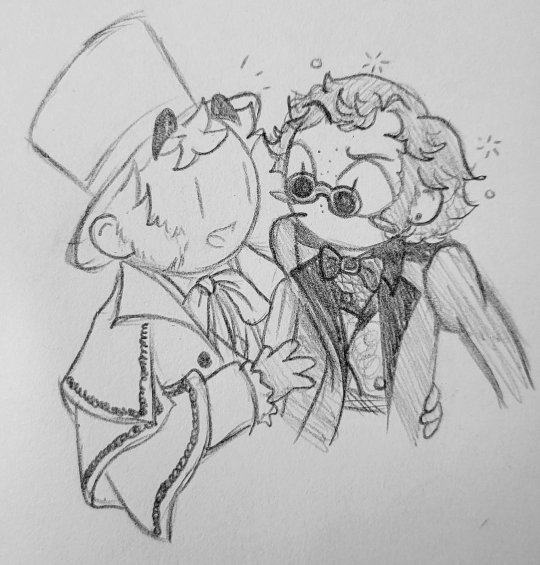
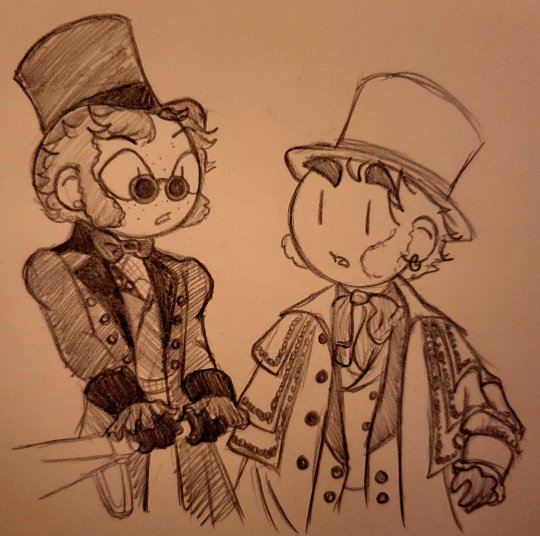
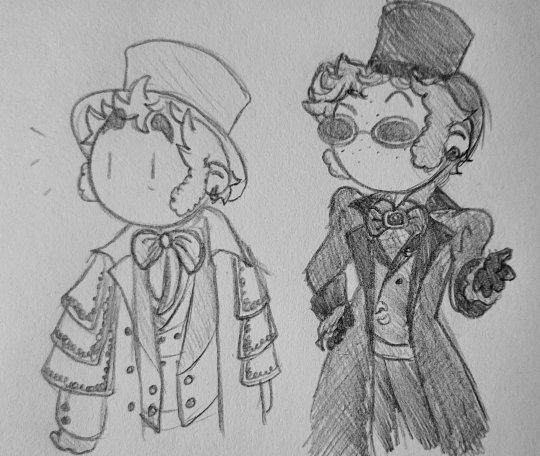
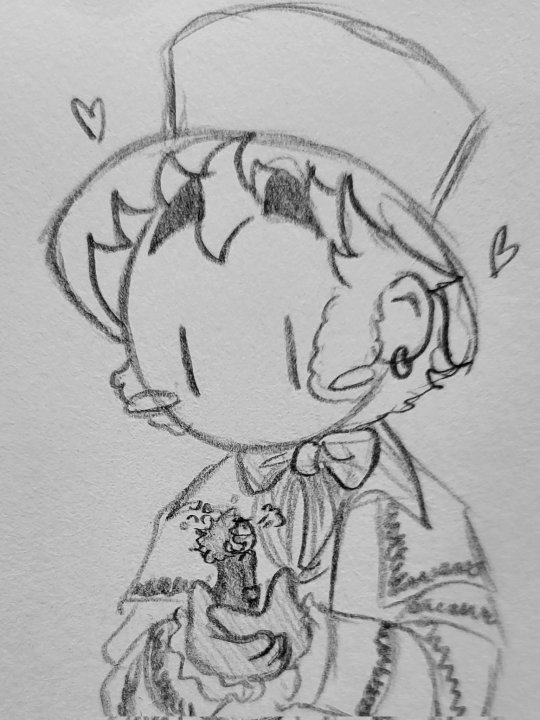
Ineffable May day 16: 1827
This is my favorite of the minisodes, but I loath drawing their outfits, so you get some reposts!
#good omens#good omens s2#ineffable may 2024#ineffable husbands#ineffable spouses#ineffable wives#aziraphale#crowley#anthony j crowley#john's art
212 notes
·
View notes
Text
Why Aziraphale is an unreliable narrator
Part 2: The Story of wee Morag
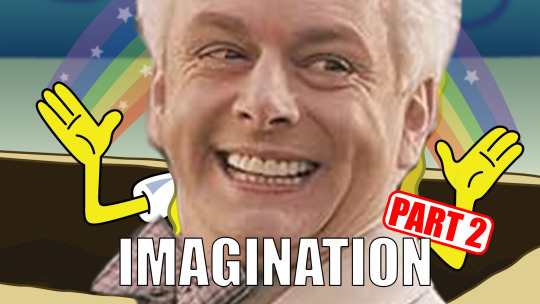
This is Part 2 of 3 total metas. Here are:
Part 1, in case you want to read about my analysis of the Story of Job first
and Part 3, in case you're impatient and want to jump ahead.
Fair warning though, for the sake of understanding some of the references, you're probably better off reading this chaptered meta chronologically. However, every part should work just as well as a standalone! I'll do my very best to make it so.
Alright, off or on you go beyond the cutty cut!
I'll start this second part off with a very brief summary of the main take aways and points from Part 1, which go as such:
Memory, as opposed to a third party's narration, is not a factual, objective retelling of a story or event. It's mingled and mangled with emotions, imaginations and exaggerations, projecting both the feelings and impressions you had back then as well as those you might have now in the present time back on whatever it is you are remembering. (Which is why we need to put everything that Aziraphale is remembering into the context of what he might have felt in the past, as well as what he's feeling right now.)
While this doesn't mean his (or anyone's) memories are lies, it does mean they're a very subjective and sometimes factually distorted representation of what actually happened, which, in our case, gives us a lot of subtext and a lot of not-there furniture to figure out and look at.
So, let's continue with S2E3 and the Story of wee Morag. We start our flashback with a scene of Aziraphale writing his diary entry on the 10th of November, 1827. Immediately, it's firmly established that this is once again not an outside-point-of-view narration, but rather what Aziraphale remembers and wrote down.
One thing that immediately stuck out to me here, is how helpful and kind Crowley is to Elspeth, pretty much from the very beginning when they meet her in the graveyard. Not only does he take on a Scottish accent so she won't perceive him as English (as she does with Aziraphale), but he also helps her drag the barrel that has the fresh body in it and, in the end, even pulls it all by himself while Elspeth simply follows behind them. Here's a rather poor-quality picture, for reference:
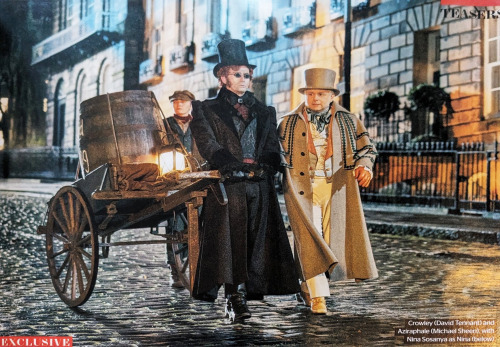
Now, we know that despite not showing it very often, Crowley has always been very fond of the humans and never really put himself on a pedestal simply because he's an immortal being himself. He likes humans, just like Aziraphale does. But, just like this story will tell us, Crowley knows that on top of liking humans, you can't just put them into boxes of good and evil and expect them to always do what is supposedly the "right" or "divinely good" thing to do. (Which is what differentiates him from Aziraphale in the way he understands and treats them, as we're shown in this minisode).
Him immediately and unspokenly helping Elspeth with dragging the barrel therefore might also be a first sign of a tiny projection from present day Aziraphale, as opposed to what Crowley might have actually done (probably just walked beside her, like Aziraphale) because he has the knowledge that Crowley really was so very kind to her in the end, wasn't he? And that he's kind to humans in general. ("Not kind! Off my head on Laudanum!" Sure, babe.)
Most of this minisode, in my opinion, is actually there to establish how Aziraphale's view of morality and good vs. evil used to be quite flawed and elitist –– and how Crowley has always been there to gently nudge him towards questioning his black and white view of heavenly right and hellishly wrong. That's why I think there's not as many hints in this minisode about Aziraphale's memories not being an accurate portrayal of what happened, as there are in the Story of Job or the magic show in 1941. (And, fear not, the latter will definitely be the most hint-heavy one). Alas, there's still a few bits and bobs in the Story of wee Morag that stuck out to me, that make a brief yet good case of the whole unreliable narration thing.
First of all: The way Aziraphale describes all of it in his diary is so different from the way we see him actually remembering it. It's almost like he tried to write this entry (and possibly all of his diary) as a bit of a thrilling short story, with himself as the main character. Which makes sense, given the fact that he adores books and would certainly be keen on dabbling in the art of capital-w Writing himself. It's yet again hinting at the fact that sometimes people (and angels) try to polish and bedazzle stories (and memories) to make them seem more exciting and adventurous, often to distract from the not-so-fun parts of it.
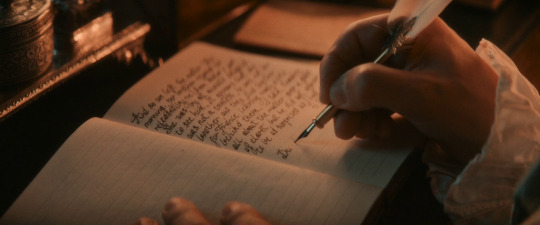
Like when Aziraphale's diary narrates:
"It was with heavy heart we arrived at Elspeth's destination. I was determined to thwart her monstrous plan!"
... and yet we see Crowley and Elspeth casually walking down the alleyway, very obviously not heavy-hearted in the slightest, while Aziraphale nervously scurries on behind them, very obviously not determined to thwart. (Timestamp-wise, it's around 17:38 in S2E3, in case you want to see for yourself.)
We get another cinematographic/auditory hint at the fact that Aziraphale's memory is heavily influenced by what he's feeling that very moment, when Dr. Mister Dalrymple –– FRCSE, thank you very much –– shows him the tumor he removed from the seven year old boy. You can see the shock and horror on Aziraphale's face once he learns of this child's cruel fate. We then proceed to hear Mr. Dalrymple's voice grow sort of echo-y and far away as the sad music swells up and drowns out his voice almost completely. It's awfully similar to what it feels like when really horrible news are broken to you and you dissociate and drift into a state of shock. Here's the clip of it, so you may listen for yourself:
It's clear that this is a very subjective portrayal of what Aziraphale is going through during this part of the memory. He's deeply horrified and saddened about the little boy having passed away so early in life – and we hear and feel this shock with him. Through him, because this is his memory. Whatever it is he's feeling and thinking, we're feeling and thinking it too because we're seeing it through his lense.
Another (less sad) hint at a possible exaggeration is the abnormally deep hole Crowley makes the two graveyard watch keepers fall into. I'm pretty sure he's very much in charge of his miracles, making this random slip-up seem a little silly – which is why I'm also pretty sure the "Might have slightly overdone it on that hole" is a wee bit of a meta hint at this just being another one of Aziraphale's dramatic bedazzlements of this story. For the *flings feather boa around neck* drama!
You know what else might be exaggerated? Hm, I dunno, maybe Crowley growing into the size of a tree for no apparent reason. Sure, yes, he's pretty high on Laudanum which is making him a bit loopy. But apart from that, it does seem an awfully big cinematographic euphemism for him being the metaphorical (and, once again, for the drama of it) literal bigger person in this scenario. He's the one who ends up saving Elspeth and who manages to secure a safe life without poverty and grave robbing for her. While Aziraphale was so tangled up in his own moral journey and main character-ism, missing that wee Morag was seconds away from death already, Crowley is the one who actually ends up growing stepping up for the human in need and saving them for good (pun intended).
In a way, it might just be Aziraphale's view of/feelings for Crowley in this very moment. Watching the demon outgrow what, according to Aziraphale's heavenly logic, is supposed to be a foul fiend, bestowing evil upon humanity – and growing into someone who does the exact opposite and saves Elspeth instead. Another larger-than-life character development, in Aziraphale's eyes. Literally.
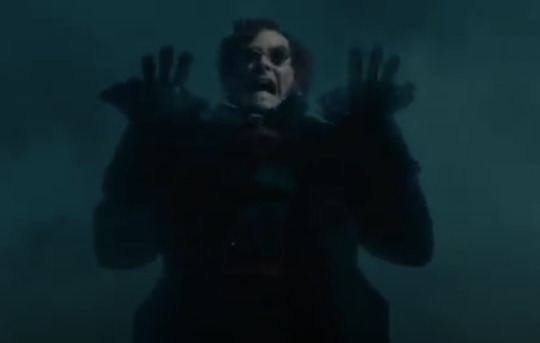
Let's switch back to the topic of the diary entry one last time, so I can make my final point of the this minisode's unreliable and a smidge over-dramatic narration of Dr. McFell. If you pay close attention, Aziraphale starts the entry we're all getting to experience with: "Last month, Crowley and I both happened to be in Edinburgh." Which means it didn't actually happen on the 10th of November, but rather at some point in October, 1827. Once we see Crowley get hydro-pumped back to Hell after rescuing Elspeth, the minisode ends with, presumably, the last sentence of Aziraphale's diary entry: "And that was the last I would see of Crowley for quite some time."
Take my hand and let's look at where the furniture isn't: This very clearly means that Crowley couldn't have been gone for more than a month, at best. Read again: "It happened last month and that was the last I would see of him for quite some time." This, albeit indirectly, clearly implies that when Aziraphale had sat down to write the diary entry, he had already run into Crowley again. Otherwise his phrasing would have probably been more along the lines of "... and I haven't seen Crowley since" or "... and Crowley has yet to return from wherever it is Hell's currently keeping him".
What's the point I'm trying to make? Good question. I guess my main point of storyteller Aziraphale being a bit over-dramatic in his narration is simply backed up by this, since A Single Month would barely pass as "quite some time" for an immortal being like him. And yet that's how he puts it, in his little Confidential Journals of A.Z. Fell, Vol. 603.
And another point that has absolutely nothing to do with the topic of this meta (but I'm still gonna make it 'cause this is my memory post): The meeting at St. Jame's Park in 1862 that so many, post-S2, took to be their first run-in after the Story of wee Morag, actually wasn't that at all. They saw each other at least once only a month later, as Aziraphale's diary lets us know. Which explains why he wasn't very surprised or concerned when he met Crowley in London, 1862. If there really had been 35 years in between those two events, the first one ending with Crowley being sucked back Downstairs to receive more than three decades worth of hellish punishment, wouldn't Aziraphale have been at least a tiny bit worried or more interested than:
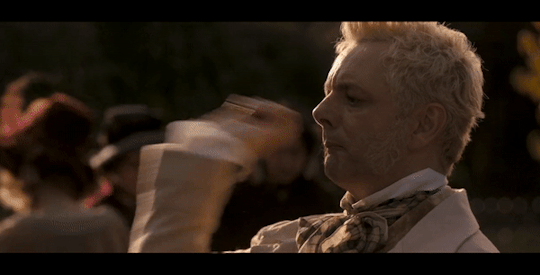
Just saying.
Alright, let's string this inflated hot air balloon of a post back together so we can outline some invisible furniture. This time with only two humble points:
Crowley through Aziraphale's lense
Backed up by how we are introduced to Bildad the Shuhite in the Job minisode (suave, cheeky, smart, passionate in shoemaking and obstetrics), it's growing quite clear that Aziraphale's memories and impressions of Crowley are very fond and impressed ones. He sees him as someone who's not only witty, funny and cool, but also as someone who has figured out way sooner and faster than him that nothing's ever black and white. Not God's plans and not the human's choices either.
Aziraphale as a bit of an exaggerating adventure author
With the direct parallel we get of inkslinger journalist!Aziraphale in the present day, it's quite apparent after this minisode that Aziraphale's memory is not only deeply influenced by his emotions, but that he also tends to have a bit of a dramatic touch to him. Although, you gotta give it to the guy: A month without seeing the love of your life, even if said life is eternal, can indeed seem like "quite some time".
Well, would you lookie here, we've reached the end of Part 2! What a journey it was. I hope you forgive me for the fact that I drifted off-course a few times. I just can't seem to reel in my silly little observations, even if they've got nothing to do with the point I'm trying to make. But hey, doesn't that just make me a little bit like Aziraphale's storytelling, in a way?
I'll let you be the judge of that.
See you in Part 3! And in case you haven't snuck a peak yet: here's Part 1 again.
Ta!
#good omens#good omens season 2#gos2#go2#good omens 2#good omens meta#ineffable husbands#aziraphale#crowley#good omens analysis#aziraphale is a storyteller#but not a very accurate one#story of wee morag#my own meta#aziraphale the Drama Queen#shakespeare who#unreliable but beloved story teller aziraphale
556 notes
·
View notes
Text
Some highlights of the panel with Gavin Finney at @theineffablecon.
Gavin Finney is the director of photography on Good Omens.
Feel free to add things in the replies if you think we’ve missed something.
- He says that Good Omens is a very fun show to work on where you can really let your imagination go.
- One of the challenges with season 2 was to top season 1.
- Everything we see on screen is real. In season 1, the bookshop was designed to be flammable. (Edit- Note: this about the props and the details put in the creation of the sets).
- About the complicated camera move planned for the kiss scene: the plan was to have a moving 360 shot to highlight the fact that Aziraphale and Crowley are at the centre and everything around them is spinning. But the performance was simply so amazing that they didn’t want to take away from that with a fancy camera move so they decided to keep it simple. He also explains that the kiss is an example of something simple that works beautifully. The lighting was done on purpose.
- With season 2 it was possible to control the weather (scene where Crowley creates a storm). The change in weather also contributed to show a change in mood (Aziraphale’s, for instance, with bright and shiny weather when he’s happy).
- His favourite sets are the magic shop (full of wonderful props and tricks), the bookshop (designed to be the loveliest bookshop in London) and the Dirty Donkey pub.
- When it comes to do things on camera vs in post production: they tried to do as much as possible on camera (Hell was mostly on camera). Scenes looking down the street or Heaven are made/adjusted in post-production.
- About the minisodes: Neil and Douglas wanted them to be as different as possible from present day so that they would be their own self contained thing. To show that they used different camera lenses were (anamorphic lenses). The minisode with Job had a religious painting aspect, the 1827 Scotland one had a gothic/foggy aspect and the Blitz one was meant to be the epitome of film noir.
- The colours in S2 look more vibrant because they used a different camera system that captures more light and higher resolution. It’s also a result of post production colour grading.
@neil-gaiman
424 notes
·
View notes
Text
Fish: A Good Omens Sex Meta Thing
A deep dive meta on fish and that deathless death.
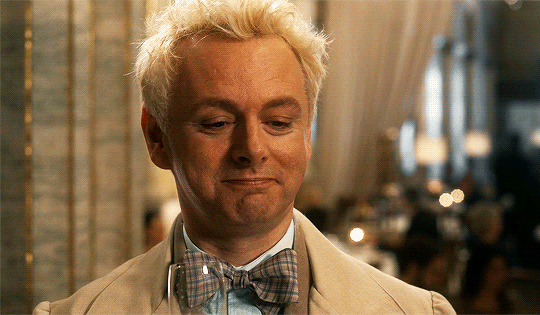

NSFW under the cut. TW: Mention of Satan's attacks on Crowley. Also for those who asked me for more on the Ineffable Husbands and trauma-informed partnership.
Aziraphale, listen to me. The supernatural world? It's a mess. Life under the sea is better than anything they've got Up there...
This is basically the requested "Crepes 2" but you don't have to have read that first. I did link it at the bottom if you have not and you're interested in more meta like this one. Thanks for reading. 💕
Couples. Romantic and/or sexual partners who have an understanding of a mutually-agreed upon level of commitment to one another and their relationship. Frequent celebrators of special occasions.
"A team-- a group; group of the two of us." A couple.
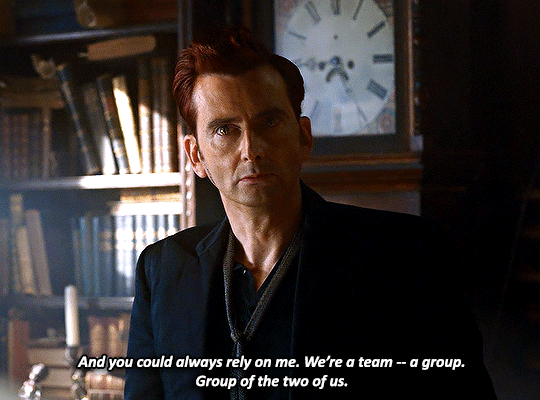
Special occasions. Notable life events celebrating milestones and past days significant to a couple's relationship.
"For special occasions." Why Aziraphale bought one dozen cases (144 bottles) of Chateauneuf-de-Pape in 1921, as he either tells or reminds Crowley on the walk to the bookshop in 2008. Only "a few bottles" were still left at that time, according to Aziraphale, after 87 years of Crowley and Aziraphale celebrating special occasions enough times as an unofficial couple between 1921 and 2008 to have drank almost 144 bottles of the wine they only drink on special occasions.
Wedding anniversary. A special occasion; the "big one" of a married couple's special occasions. Celebrated annually by married couples as a romantic day that honors their commitment to one another. In S2, the day of The Meeting Ball is the night that Armageddon: Round Two gets underway. It is also the wedding anniversary of...
Mutt and his beloved spouse. The lovely magician who owns Goldstone's Magic Shop in 2023 and his beloved spouse, who is dry-witted, trans and had on a dress the color of Crowley's eyes at The Ball. Paralleling characters to Crowley and Aziraphale.
Anniversary. For partners who are not married, usually celebrated as a day of significance in their romantic relationship, chosen for its importance to them. Almost always related to a "first" in the relationship, like the day they first met or on which they had a first date.
"This is The Big One, Crowley..." What Satan (while impersonating the voice of Freddie Mercury) said to Crowley about Armageddon while assaulting him in 2008, on the night Armageddon: Round One began. Crowley was supposed to be having dinner with Aziraphale at the time.
The 1.01 sushi scene. Our re-introduction to Aziraphale in 2008. A series of indicators that we learn throughout the course of the season teach us that Crowley was supposed to be with Aziraphale in the Japanese restaurant on this night before he was delayed by Hell, assaulted by Satan, and forced into helping to start Armageddon.
Various scenes in S1 show us that Crowley always comes up on the same side of Aziraphale if he is approaching him from behind when meeting him but we don't yet know that in the first scenes of 1.01. As a result, we might not immediately realize that the reason why Aziraphale opens his eyes and looks to his left after hearing a miracle chime in this scene is because he expected that it was Crowley arriving to meet him after having been running late. In reality, it turned out to be Gabriel on his right-- which Aziraphale first sees in a mirror and which will be mirrored in additional scenes in the show (Crowley dragged to Hell in 1827 and the Gabriel statue on the other side of Aziraphale, etc.). Dialogue from the scene set the next day in St. James' Park that we will look at later on in the meta also confirms that Crowley was supposed to be with Aziraphale in the 1.01 sushi scene.
The sequence of scenes at the start of the 2008 minisode also sets this up by giving us Crowley alone first and letting us revel a bit in how fun he is and like him even more. The contrast with Hastur and Ligur establishes for us that Crowley is about a trillion times smarter and more enlightened than these guys. It's the second scene with Satan, though, that exists to show us that while some of the demons are just idiots, demonic life for Crowley is actual hell.
The "Bohemian Rhapsody" he so endearingly rolled up blaring in The Bentley comes back and now takes on a nightmarish tone as Crowley receives instructions from Satan while driving The Bentley and we learn that Satan can possess him at will and Crowley's sunglasses-- even in the dead of night while driving alone-- start to make more sense. They're a defense mechanism but he's actually defenseless in the face of this threat. It's from watching Satan get in-- through the radio, taking over the music, speaking through the voice of a non-evil entity, jumping through the air and through Crowley's sunglasses through his eyes and into his mind and rendering his body immobile while he's driving The Bentley-- that we are taught the core of what it means to be a demon in Good Omens.
The demons belong to Satan, in Satan's view. They are part of his collective of souls who exist to serve him. They are not individual people existing independent of him. There is no such thing as bodily autonomy in Hell.
What Satan does to Crowley in 1.01 is a metaphor for sexual assault. It's a forcible attack on his body against his will and without his consent. Though the scene is mercifully short, we are left with the awareness that it is short for reasons of the plot in this instance-- because Armageddon is beginning and the purpose of the attack in this moment is to give Crowley directions on delivering the antichrist baby. The scene, though, shows us that Satan can do this to Crowley whenever he wants and Crowley-- an otherwise very powerful being-- has no known defense against it. Crowley is unsurprised by it and that, plus all his various defensive layers already in existence in 1.01, show that it has happened before. Crowley has been on Earth for 6,004 years in 2008 and the implication here is that these assaults have been happening periodically the entire time and are among the issues most responsible for the PTSD symptoms he shows throughout the show.
It's off of this assault, though, that we segue into our re-introduction scenes of Aziraphale in the present and they are, at the start, the exact opposite of this nightmare that Crowley is living. As Crowley is attacked in his car on a dark road alone at night and then has to narrowly avoiding killing a man in an oncoming truck, we move over to Aziraphale's world, not yet realizing that this is the world that Crowley lives in when he can get away from Hell-- that it is actually their world together.
Aziraphale is presented with the sushi from his friend who has prepared it specially for him and we listen to Aziraphale thank him. The Italian of "Bohemian Rhapsody" (symbolic in this moment of Dante's Inferno and Hell) gives way to Aziraphale speaking Japanese (symbolic of mindful living.) The tone is all kind and gentle-- respectful and peaceful. We then get what is, really, the exact opposite of what just happened to Crowley, which is Aziraphale taking a slow breath with his eyes closed, inhaling the scents of the brine of the fish and vinegared rice and the herbs, and centering himself in the present moment as part of the experience of enjoying his meal.

The immediate contrast is drawn between Satan-- Crowley's rapist, who terrorizes him-- and Aziraphale-- Crowley's partner, who loves him, and with whom he has the kind of consensual, mindful, sensual experiences he was supposed to be getting up to on this night when Armageddon began instead.
In S2, the importance of the sushi scene from 1.01 returns as it is mirrored during the attack on the bookshop. Once again, Crowley is away from Aziraphale when he should have been there by that point and Aziraphale is worried about him. Present instead is, once again, Gabriel. This time, Gabriel has undergone a bit of a Jim journey. (Aziraphale offering him hot chocolate instead of tea in 2.01 was also set up by the sushi scene, as it's off of Gabriel being grossed out by the "rose matter" tea, showing again how important the scene is.) In S2, Gabriel is with Aziraphale again, this time pushed back further into the bookshop, and where are they in the bookshop-that-represents-Aziraphale during the sushi scene mirror? They're upstairs, on the landing.
Specifically, they're just inside the top of the stairs in front of a room, the door to which we are shown several times in S2 but which we have not yet seen open.
We have gone into the room next door to it-- that's the guest bedroom, where Gabriel stayed during the season. By process of elimination and out of an idea of convenience here, the room we haven't been inside of that is located at the very top of the stairs is almost certainly Aziraphale's bedroom. So, we've gone from S1 and having Gabriel show up unexpectedly while Aziraphale mistook him for Crowley while he and Crowley were supposed to be having one of their sexy meals together to S2 and Gabriel now there in the mirror scene in front of their bedroom, drawing a bit of a correlation between what these two scenes are both about.
There's also something symbolic to the idea that S2 uses invitations and doors and rooms in the bookshop to symbolize Aziraphale himself and who he lets in and whose voices he is, for better or worse, listening to at different times-- with his mental health crisis being symbolized by the bookshop being essentially overrun to a point that anyone can now get in. The one room that is shown to us but the door to which never is opened in S2 is the bedroom door. The bookshop can get overrun and others can get deeper into it than we've seen before-- demons in the living room, Maggie and Nina and Gabriel upstairs and in the back kitchen table area like the family they've become-- but the bedroom door stays closed because only Crowley and Aziraphale are allowed in there. No one but them can open the door. Metaphorically-speaking... and probably literally as well.
As the sushi scene is paralleled in S2, we get Shax there bullying Aziraphale. Shax is jealous of Aziraphale and his relationship with Crowley and she also fails to understand it because she sees Crowley as a demon like her and presumes he's as dark as she is, having no idea that Crowley's demonic schtick is an act to survive. She gives voice to these questions (and to Aziraphale's most illogical self-doubts-- but self-doubt is never logical...) when she asks:
"Aziraphale, what *are* you? Crowley's emotional support angel? The softest touch? The one who went native? Do you need more big, human meals, Aziraphale? Shall we send up *the sushi*?"
Shax is actually doing something here, language-wise, that the show first did with Hastur in 1.01, and that's making them both useful idiots when it comes to language. Remember Hastur's mistranslation of "ciao" as Crowley leaves the graveyard with the baby? What Crowley said was, as we know, Italian-- Hastur got that bit correct-- but instead of translating it in his mind as meaning the "hello"/"goodbye" that "ciao" means in Italian, he confused it with its homophone of "chow", which he said "means 'food'." It does but in an informal way or in reference to food given to animals.
This is darkly ironic in the scene because of where Crowley is headed in the next scene-- and where he's supposed to be during both scenes. He's supposed to be "chowing down"/having food-- having dinner-- with Aziraphale and food is, as we'll learn over the course of the 2008 minisode, euphemistic for sex in Ineffable Husbands Speak and symbolic in relation to it in the show itself overall. Instead, Hastur isn't entirely wrong when he translates "ciao" as "chow"-- and he might have done so unconsciously in his mind because he knows Satan is going to contact Crowley with instructions soon. He sees Crowley as "chow"-- in the sense of food fed to the animal that is Satan.
In 2.06, while Crowley is taking Maggie and Nina to safety outside the bookshop, Satan is mentioned when Shax demands that Gabriel and Beez be given to her to take "as gifts for Our Master Satan." Dagon-- Head of the Dark Council and not known for mincing her words-- replies that Satan "wouldn't want them... maybe as hors d'oeuvres." Not a single person in the room-- which contains almost every major non-human character in the show shy of Crowley-- disagrees with this assessment. Rape is not about sex-- it's about power-- but in a show that uses food as euphemistic for sex on several different levels, Dagon's comment is chilling.
It not only takes the attacks on Crowley that are already a metaphor for sexual assault and codes them through food in such a way that the feeling you get from the 1.01 Satan scene-- how it comes with an implication that the assaults aren't always a delivery of instructions-- is correct and that, unsurprisingly, Satan is a rapist in every way possible, but it also sees someone who would know in Dagon state that Satan would not actually care that much about Gabriel and Beez. He'd rape 'em, sure, is what Dagon is saying. He's Satan. But they would be just hors d'oeuvres. They're not who he's really fixated on.
The Grand Duke of Hell who betrayed him and their former Supreme Archangel partner are not interesting to Satan is Dagon's statement and not a single person in the room challenges that. No one says anything about it and the scene is deliberately structured so Crowley is not in the room when it's said to create this reaction in the others... the implications of which are just horrible where Crowley is concerned.
Back to Shax in the bookshop attack scene...
Shax parallels Hastur here because they are using her lack of language skills to highlight something to us by what it is that she doesn't understand. Much like with Hastur unintentionally spelling out what's really going on through mistranslations of words, Shax is trying to bully Aziraphale and she's tossing insults at him that are, actually, in the alternative meanings of what she's saying, the answers to the very questions she's been asking.
"Aziraphale, what *are* you? Crowley's emotional support angel? The softest touch?..." In insulting Aziraphale, Shax is using Crowley's mental health issues as a way of insulting both of them here, which shows how Hell obviously isn't exactly the most trauma-aware place. She's obviously saying that Crowley is comparable in mental health issues to humans (whom the demons see as beneath them) who have a need for emotional support animals. Like Hastur with the "chow", there's an animal comparison being drawn beneath the words used here but instead of the ominous lead-in to Crowley being attacked in 1.01, in S2, we have it about Crowley and Aziraphale, not Crowley and Satan.
So, Shax is calling Aziraphale Crowley's pet, right? And then she calls Aziraphale "the softest touch", which is a phrase meaning someone who is really gullible. What Shax doesn't realize is that the other, human-derived meanings of what she just called Aziraphale are the answer to the question of what Aziraphale is to Crowley.
In British slang, "pet" is a term of endearment. To pet someone is to touch and kiss in a way meant to be sexually arousing-- as in, "heavy petting."
The softest touch. This is, quite literally, the definition of a caress.
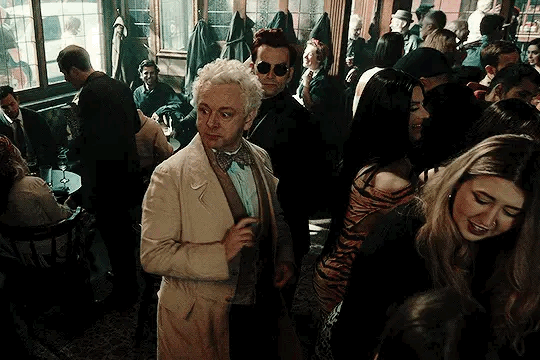
In S2, Aziraphale pats his and Crowley's pet-- The Bentley-- but he pets Crowley. The only time he tries to actually pet The Bentley is when he's semi-jokingly making it a sexual metaphor for Crowley. It underscores that Shax is almost there in getting it-- she's just not quite understanding the meaning of her own words-- which are words that, like Hastur's ciao/chow moment, exist to tell *us* something in how we look at them more than to tell the character speaking something.
In effect, we get a whole scene in S2 that parallels the 1.01 sushi scene by defining some more what it's really all about through Shax not quite fully getting it. What is Aziraphale to Crowley? is her question and the answer is the softest touch, just in the other meaning from the way that Shax says it. Aziraphale is kind to Crowley and gentle with him. He's the mindful sushi night in the face of the horror chow of Hell. They love each other. It's soft and sweet and that's why Shax has trouble understanding it-- it flies in the face of what she thinks the demon Crowley would want because of the reputation Crowley has sold everyone on regarding who he is, which isn't who he really is at all.
"The one who went native. Do you need more big, human meals, Aziraphale? Shall we send up *the sushi*?" Aziraphale is the angel who "went native"-- he lives a mostly human existence with Crowley alongside the humans. Shax clearly doesn't eat that much as no one has ever called sushi a "big meal" lol but besides that bit of humor aimed our way, this is more tying of food to sex. Aziraphale likes food and he likes sex and in Ineffable Husbands Speak-- which Shax does not speak-- food is euphemistic for sex. What's unnerving about this scene in this moment is that it plays like the later scene between Maggie and Shax does-- as if Shax is reading the thoughts of the character she's bullying and lobbying them back at her. She might well be doing this here and that's why the sushi comes up-- Aziraphale is thinking about it because Crowley should be here and isn't and Gabriel is right near him instead and it reminds him of 2008. (This wouldn't be the only callback to S1 in this sequence, either; there's Aziraphale explaining the fire extinguishers to Nina not that long after this.) Either way, it's writing designed to directly correlate this part of the bookshop attack with the 1.01 sushi scene to further underline what the 1.01 scene is about.
Okay, so, let's look then at why we're so into repeating bits of this sushi restaurant scene in GO and what it tells us about Crowley and Aziraphale's story by what other scenes it ties to...
As the 1.01 episode continues, we get another scene pretty soon after the sushi scene which adds another layer to this by recontextualizing our understanding of the sushi scene-- that's their lunch at The Ritz the next day, in which we learn that Crowley is rather into watching Aziraphale eat and Aziraphale loves it. This then helps to explain Aziraphale's look in the sushi scene when he turns to look in the direction of where he thinks Crowley will be on the left, before it clicks that Crowley is not there and he sees, instead, Gabriel on his right via the mirror on the wall.
Aziraphale hears the chime with his eyes still closed. His eyes are then still on the food when he reopens them and he hasn't had time to see that Crowley is not beside him before he turns in that direction and this is the expression on his face as he does:

That is a pretty sexy little look that was indisputably supposed to be given to Crowley...
In the later scene where they're at lunch at The Ritz, we come in on their meal at the end of it. Aziraphale is on the last forkful of his dessert and we get the idea of kinky lunch from what we see on the tail end of it. But before it? Back at the start of the episode, set the night before? We see that everything that happens the next day at The Ritz actually happens because they weren't able to be together the prior night. It will also help us to understand how Crowley knows about "the fascinating little restaurants where they know" Aziraphale in the St. James' Park scene.
The 1.01 sushi scene tells us that, by 2008, they sometimes sneak out to a quiet, dark place where they think they won't be seen to have dinner together.
What's most notable about the set of this scene in the sushi restaurant is the shocking brightness of one color in particular.
The scene leading into it, as we noted, is Satan's attack on Crowley in The Bentley and that scene is, appropriately, very dark. It's pitch black night outside and Crowley, in his perpetual black clothes, half-blends into the night around him. Flecks of grey and silver are the main sources of light in the scene. The same color scheme tips into the Aziraphale sushi restaurant scene-- with two exceptions. The silver grey remains (Gabriel) and so too does the thick, black darkness but there is more light in the restaurant and it shines over Aziraphale. He looks bright against the black darkness, even though he wears beige. He is the light that is missing from Crowley's scene. But that's not the shocking color to us in the scene. That's the one that saturates its way through the darkness around Aziraphale. That color is...
Pink. The color you get when you mix white (Aziraphale) into red (Crowley). Traditionally, a color of love, romance and health.
Pink plume. The energy field emanating from the bookshop when Crowley and Aziraphale performed a miracle together to protect Gabriel in 2.01. Also: part of Mrs. Sandwich's hair accessory during The Meeting Ball. Mrs. Sandwich represents sex and healthy communication in 'The Whickber Street Shopkeepers and Traders Represent The Stuff of Life' thing the show has going on.
"In the pink." A phrase meaning "in good health."
1967. Flashback scene in the 1.03 Cold Open in which Aziraphale gives Crowley holy water and they discuss their relationship-- specifically, trying to be more openly together. The scene is drenched by the pink light from the sex shops (one called the "Love Shop") that were then in the spot where Give Me Coffee or Give Me Death (symbolic of freedom) is in S2.
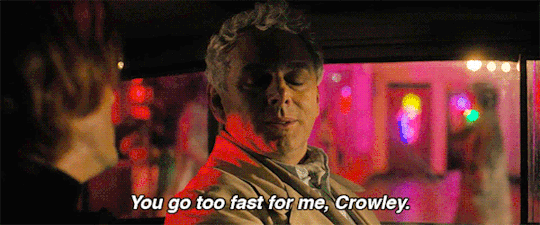
Jane Austen. One of the most famous writers to ever live (sorry, Crowley, but she is lol.) Writer of romance novels. A human that both Crowley and Aziraphale knew in the early 1800s. As Aziraphale brings her up to Crowley while they are talking about romance, pink floods the frame through the clothes on the extras in the wider part of the shot besides him. Pink is also present throughout this scene in general, which already parallels 1967 via it being related to set up, The Dirty Donkey and Crowley's turtleneck.
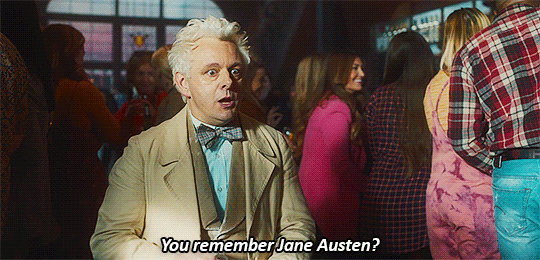
Back to the pink-dipped sushi restaurant in 2008... what else do you notice about this scene that is familiar, now that you've seen all of S1?
Maybe that Aziraphale is actually sitting at a bar? And thought Crowley would meet him there, so they would be sitting at the bar together? Aziraphale also had just spoken at the start of the scene with the restaurant person on the other side of the counter. Where have we seen one of them doing something like that before?
That other rather fish-oriented scene: Rome. 41 A.D....
Rome. 41 A.D.. Aziraphale runs into Crowley in a tavern in Rome. Crowley is miserable and not having the best day of his demon life. Frustrated by the temptations he's been sent to perform for Hell that have him enabling horrible men in the Roman military, he's lonely, tired and grouchy. This initially was worsened by the arrival of Aziraphale, whom Crowley always loves to see but who, in that moment, was a reminder of how broken Crowley felt.
PTSD. Post-Traumatic Stress Disorder. A psychological condition brought on as a result of experiencing the psychological shock of a traumatic event or events. Some symptoms of PTSD include disturbed sleep, difficulties feeling safe, difficulties trusting yourself and others, anxiety, depression, and intimacy issues.
"In the pink." Remember the phrase meaning "in good health'"? Not a lot of pink in the Rome scene... initially. 😉
"Salutaria." What Aziraphale says in toast as he and Crowley clink glasses. Means "to your health." Crowley clinked glasses but quickly looked away, leaving Aziraphale thrown in the moment as to why Crowley was not rejecting his presence entirely but seemed uneasy and was putting up some walls between them that he had not in this way up to this point.

So, why was Crowley doing that?

Anorgasmia. Modern, clinical umbrella term for all issues relating to disorders surrounding an individual's ability to orgasm. If physical or medicinal reasons are eliminated, however-- as they often are-- then anorgasmia is a psychological mind-body disconnect.
Not an arousal disorder. Sufferers of anorgasmia still experience desire, compounding the impact of the disorder.
Secondary anorgasmia/situational anorgasmia. The inability to orgasm unless under certain conditions, such as through self-stimulation (masturbation). The inability to enjoy partnered sex. Extremely common in rape/sexual assault survivors.
(Diagnosis for anorgasmia are related to biological sex but Crowley is able to switch that at will so he'd be both of these, which are fundamentally the same thing.)
Hot Water Boiler. Device which heats up water in a house or apartment. In S2, a metaphor for anorgasmia.
In S2, Shax is living in what used to be Crowley's apartment and asks him if he knows how to fix the hot water boiler, as it has "two yellow lights" and isn't working. The point is that this used to be Crowley's apartment. Crowley, in 2023, knows how to get beyond a bout of it. He's fixed his own metaphorical hot water boiler-- and also the literal one when he used to live in that apartment. And while he's being sarcastic because Shax won't stop hounding him and Aziraphale, he's also giving her the most sage advice he knows, as he has continuously been doing during the season. In this case, it's to self-love a bit (which is actually prescriptive for anorgasmia in our modern times as well.) That he does is suggestive of the prior issues with secondary/situational anorgasmia.
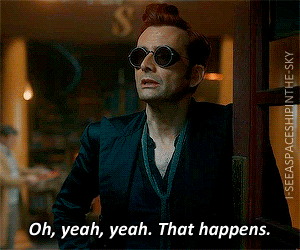
Alcohol (in Ineffable Husbands Speak). As we looked at in the Crepes meta: Surface layer: alcohol. Hidden language layer: Sex. Quite extraordinary amounts of alcohol. An extremely alcoholic breakfast at The Ritz.
Whiskey. Alcohol. What Crowley orders in a bar. Usually Talisker, which is a single-malt scotch. (Scotch being whiskey made in Scotland.)
Broken bottles of whiskey. What was in the case Crowley brought Mrs. H in 1941 at the start of the sexual metaphor that is The Bullet Catch.
Trauma-informed partner. Modern term for a romantic and/or sexual partner of a trauma survivor who is aware of the pervasive nature trauma can have on a person and who endeavors to provide a sense of safety-- physical, psychological and emotional-- for their partner and to create a relationship centered on healing and recovery, rather than one that causes further distress.
Frequently survivors of one or more forms of abuse themselves, as Aziraphale is. Not expected to be perfect but just to do their best by their partner.
Characteristics of trauma-informed relationships include kindness, empathy, mindfulness, gentleness, well-earned trust, a sense of playfulness, and a well-developed shared sense of humor. (Sound familiar? 😊)
The Bentley. Crowley's car and Linus blanket. As sexual metaphor, when Aziraphale is feeling cheeky: Crowley himself.
Driver's license. Documentation that must be obtained in order to operate a motor vehicle. Requires permission, experience, necessary skills, and willingness to learn. In London, not originally necessary to drive upon the invention of cars, until everyone realized what an absolute disaster that was. Aziraphale long ago passed his test and has had a driver's license since shortly after Crowley bought The Bentley. They did not require licenses at that time but always-eager-to-be-thorough Aziraphale made them give him a test to be sure he was truly qualified to drive.
As sexual innuendo: Crowley, we're absolutely ridiculous. You won't give up your car and I wall myself off in a fortress of books I can't part with but you've been "in my bookshop" and I've been "driving your Bentley" for an absurdly long amount of time. We even swapped bodies a few years ago. It might not actually be possible to be any more intimately familiar with a person than we are with one another and we both know I had these car keys the moment I asked for them so hand them over. No one was exactly a trauma-informed partner in those days but I was-- aren't I marvelous?😉I'll treat your car as gently as I treat you. Give me the keys or I will just keep going until I run out of car sex innuendo and I should warn you that I have lots more...
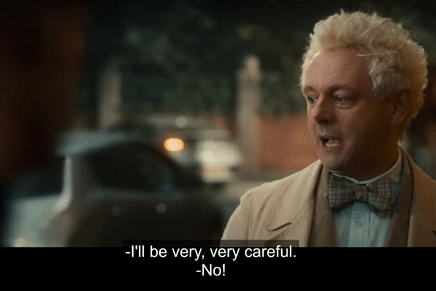
Trauma-informed partner. Aziraphale.
Mindfulness. A state of mind that focuses on being in the present moment by being conscious of one's thoughts, emotions, and bodily sensations. A state of the mind being connected to the body and experiencing the present moment consciously and fully. Frequently used to help combat PTSD, anxiety and depression. Also frequently used as a therapeutic intervention for assault survivors experiencing intimacy issues.
Aziraphale and Crowley smelling the magic shop in Season 2 and Aziraphale inhaling the scent of the sushi in 1.01 are both examples of mindfulness exercises. The sushi scene is tied to sex, as the food kinky thing is a form of foreplay, suggesting a focus on sexual mindfulness in bed.
Mind-body connection. What is in need of repair in sufferers of situational/secondary anorgasmia. Sexual assault causes the body to associate a loss of control with being under threat. Whereas people who have not experienced a violation of their bodily autonomy tend to respond to sexual stimulation with a response of pleasure, those who have been hurt have bodies that are wired to react to being touched or to feeling out of control as if they are under threat again, even if they are intellectually aware that the new situation they are in is not dangerous. What is arousing for others can cause a sense of anxiety instead of pleasure. There is also the risk of flashbacks to being attacked.
Healing the mind-body connection requires a trusted partner with whom the person suffering from anorgasmia feels safe and who is willing to help keep their partner in the present moment and help them "re-wire" and recover their body through new, positive experiences.
Asmodeus. The Demonic Prince of Lust. Crowley. A persona to have in Hell to give him big reputation that didn't involve him having to kill anybody and that also acted as a cover for his anorgasmia.
"Crowley." What Crowley asked Aziraphale to call him in 33 AD, just 8 years prior to Rome. An admittance of being mad about Aziraphale.
"What am I supposed to be, an aardvark?" In Rome, as Crowley grows nervous by this wine-drinking Aziraphale who also has nothing to do for the evening that has shown up in his world on a miserable day, he responds to Aziraphale's "still a demon, then?" nervous chatter with a line of his own, asking what else he was supposed to be? An aardvark? Of course, if Crowley was not a demon, being with Aziraphale would be easier and he wouldn't be in this mess in the first place but an aardvark is not just a random animal that Crowley thought up here.
Just prior to this moment, Aziraphale had approached him with "Crawley-- Crowley" and a soft smile. It wasn't actually a mistake on Aziraphale's part but a silent question: is it still alright to call you that? Thanks to S2 and the Job minisode we can see the 33 A.D. scene- in which Aziraphale learns of Crowley's new name-- in a different way. We see it as Crowley romancing Aziraphale a bit-- responding to Aziraphale being obviously a little jealous of Crowley's reputation as the wild Asmodeus with a whisper of how he'd changed his name to "Crowley"-- something that we know now that only Aziraphale understands. In Rome, eight years later, Aziraphale is asking by saying both names if that's still something Crowley feels-- and silently saying he hopes it is by subtly asking and by flirting with him a bit.
Crowley doesn't object to Aziraphale calling him "Crowley" and that encourages Aziraphale to join Crowley, who sends signals that he wants his company, even if he's grouchy. Maybe especially because he's grouchy. He can be grouchy around Aziraphale, who is his friend and will listen.
Aardvarks. Primarily eat ants and termites. In the insect metaphor in the show, humans are ants. (The "ants go marching" of The Flood scene.) Demons were hornets in this analogy but also flies and one could assume that termites might also be a good demonic insect analogy, as termites eat decaying plant material and demolish the dying down into the ground. Since food is sexual metaphor on Good Omens and living creatures are metaphorical in multiple ways, being an aardvark then is being someone who both fucks and kills other demons and humans. Being an aardvark is actually a good metaphor then for what's expected of Crowley in Hell and he obviously has some issues with it.
He doesn't want to kill anybody and he's sitting there wearing Roman military regalia, having been sent by Hell to facilitate some death and destruction in a way that he hasn't been able to Bildad his way out of this time. Aziraphale's presence is always welcome but Crowley's crabby in this moment because he knows Aziraphale is in a place by this point where he wants to sleep with him and they just ran into each other in a tavern and both clearly have the night free and now Crowley's got to decide if he's going to tell the angel or not that he's a disaster of an aardvark.
Aphrodisiacs. A substance purported to increase sexual desire. Named for the Greek goddess of sexual love and beauty, Aphrodite, who has been depicted since antiquity usually nude and on the shell of an oyster (or, occasionally, a scallop), as both are two of the oldest purported aphrodisiacs known to man.
Oysters. History's foremost food-related aphrodisiac... though that's not really proven. A few years ago, Italian and American scientists did a joint study to attempt to prove if oysters really did increase virility. What they found was a very minor increase in testosterone in men brought on by one of the compounds of oysters (which is also found in some other kinds of shellfish.) The difference was so small, though, that the scientists determined that an individual would have to consume a lot of oysters (like, a bucketload) to notice any significant difference. In other words?
Whether it works or not is, like with almost all aphrodisiacs, in the mind of the individual. If you believe it will work, it likely will. It's mind over matter. If you want it to work, it probably will. Thematically, an interesting thing to throw in a scene involving a character deciding he's in a place to work on overcoming psychologically-based anorgasmia.
The ancient Romans were obsessed with the oyster-- particularly the soldiers of the Roman military. Much of the cultural awareness of oysters as having a reputation today as being sex-boosting food is actually rooted to the beginnings of that trend in ancient Rome. Both Crowley and Aziraphale would have been aware of the reputation of the oyster in 41 A.D. and Crowley wearing military regalia might have been one of the reasons, in particular, that Aziraphale chose oysters as an euphemism to convey his meaning.
Oysters. Fish. To eat them, you have first got to get them out of their protective shells.
Adam and Eve. The first humans and the other inhabitants of The Garden of Eden. Parallels to Crowley and Aziraphale. Eve gave Adam food-- showed him the pleasures of eating the apple. It sent them on a path of sensual exploration and Adam, freed by Eve showing him food, gave her sex in return.
The other two in Eden at the time-- The Angel of the Eastern Gate and The Serpent of Eden-- are actually no different.
Crowley tempted Eve but Crowley also parallels Eve to Aziraphale's Adam. Crowley encouraged Aziraphale to try the ox ribs and unleashed the raging hedonist that Aziraphale can be. Rome in 41 A.D. is Aziraphale then realizing just how much they are Adam and Eve. (Something that they become aware of over time and is at the root of things like Crowley dryly saying that it's "time to leave The Garden" in 2019 in S1, when they leave a park to go have kinky lunch together.)
By Rome, Aziraphale is now a devoted gourmand. He also drinks now; he's tried wine at some point in the interim years between the Job minisode and this scene. (This is the first scene in which both Crowley and Aziraphale drink and the first time we see them share a toast-- something that becomes symbolic of them as lovers in scenes in the future, like its parallel scenes in 1941 and 2019-- furthering the suggestion of Rome as the start of their sexual relationship.)
Aziraphale might be in Rome on Heavenly assignment but that's not what he mentions to Crowley, if he is. Instead, he talks about Petronius, whom he assumes from Crowley's military clothes that Crowley will know and whom Crowley does. If referring to, as we suspect, Gaius Petronius Arbiter, then Aziraphale is referring to a being so queer even the historians can't get around acknowledging it-- a courtier who was the taste and style maker of the Roman empire, and who is believed to be the author of The Satyricon, which is basically the foundation of satire in literature but also famously contains a whole chunk of it that is just basically erotica.
Some details of Petronius' life are a little vague so Good Omens is exploiting the wiggle room here to suggest that he actually did own a restaurant. In reality, Petronius wrote in The Satyricon a description of ancient Roman feasts that have been seen as maybe barely satirical because of the whole bacchanalia of the period that Petronius was satirizing. So, by 41 A.D., Aziraphale is moving in wealthy human queer circles in ancient Rome and enjoying all of the pleasures life on Earth has to offer... and he's found Crowley alone in a tavern and is throwing as many of these things together in a sentence at one time as possible to convey an overall sense of would you like to join me?
The Job minisode has already happened. Aziraphale is more than aware that Crowley was enjoying watching him eat. They're both here with the night free and blending in amongst the crowds has never been easier than it was in highly-populated Rome. Aziraphale is used to picking up humans and it's different than it is with Crowley, who is quasi-immortal like he is and his friend and somebody for whom Aziraphale has feelings. There's also something funny about the fact that Crowley is in a (literally) hellish mood and Aziraphale is pretty undeterred and still goes for it. In attitude, Aziraphale is basically like You're in a terrible mood--you need to get laid, Crowley. Lucky I showed up, isn't it? 😂
Meanwhile, Crowley is fully aware of what Aziraphale is up to. He's known since he heard Aziraphale approaching him and has been mulling over how he's going to handle it. The grouchiness isn't just about his bad day-- it's anxiety manifesting as crabbiness. To his credit, Aziraphale seems to get that even before Crowley more specifically shares the source of that anxiety.
So, Aziraphale goes for it and how he does is to pick up on their way of speaking to one another euphemistically that they started in Job's courtyard and introduce food as a way of speaking about sex. This is already amusing in S1 but it's funny as fuck after S2 when we know that the ox ribs have already happened at this point and that that's why Aziraphale is going this route. Aziraphale's like how to see if Crowley wants to smash? Tell him I'm hungry wink wink... 😉
I would also like to point out that they are already in a tavern that sells food. In the wider shots of Crowley in the second half of the scene, a plate of food is on the table beside him. There are oysters *in this bar* lol. Oysters were not uncommon in ancient Rome by this point-- if this conversation were really entirely just about trying this particular kind of seafood, they could just order some from the woman who served Crowley his drink who is three feet away for the entire scene and try oysters right here.
By bringing up Petronius and another restaurant where they sell sexy fish, Aziraphale is laying down an ancient Roman, euphemistic equivalent of do you want to get out of here?

To tell Crowley that he [Aziraphale] hears that Petronius "does remarkable things *to oysters*." To ask Crowley to go to bed with him.
Specifically, to see if the food kinky Crowley wants to go with him to Petronius' new restaurant and try these oysters the human guys are so on about and then go back to where Aziraphale is staying and see if the oysters really do anything to their oysters.
With this one sentence, Aziraphale has just turned "oysters" into three specific, separate-but-interrelated things at once:
1) oysters are fish-- just the seafood itself-- as we're always also talking about the thing on the surface level as well in Ineffable Husbands Speak and this is no different. Petronius makes some yummy oysters, according to the restaurant reviews of ancient Rome, and his new restaurant is an opulent food orgasm of a place and Aziraphale correctly thinks that would be appealing to both of them. He loves to eat and Crowley loves to watch him eat and does Crowley want to go on a little date to do that-- just also with actual sex this time?
2) oysters are aphrodisiacs-- Aziraphale is bringing up the fact that everyone is talking about how eating oysters can increase your sexual desire and bring about more pleasure for you and your partner(s) in bed. Aphrodisiacs are evocative of partnered sex. Not that you can't take them for fun times on your own but most people do not so bringing them up then sets up the verbal italics of "to oysters" that lands Aziraphale's invitation, unintentionally, straight in the heart of Crowley's issues, because:
3) oysters are a partnered sex orgasm-- Aziraphale says he (Petronius) "does remarkable things to oysters" so Petronius makes delicious oysters, which are what you eat to increase sexual desire and therefore what apparently cause you to experience more pleasure for longer and to climax harder... the innuendo is that the oysters (the aphrodisiacs) do things to your oysters (your orgasm).
Surprise twist, Aziraphale...
Crowley has made sure it never occurs to anyone that he has problems in bed and that has included Aziraphale up to this point.
Crowley basically now has a couple of choices. He can gently rebuff Aziraphale's offer, hopefully without embarrassing him too much, and they can try to pretend this never happened, and then he knows that Aziraphale is probably never going to ask him again. Not an option. Who knows when else they might find each other with the night free like this again? and Crowley does want to try.
He can pretend there's nothing wrong with him and stress himself into a disaster, like he's probably tried to do with humans before but they die within a couple of decades and take the embarrassment with them but Aziraphale's going to live for ages, is really his only friend, and Crowley's in love with him. Crowley's self-sabotaging at times but he's also an optimist and a romantic, and it's those things that give him some hope that he might not be permanently broken.
Finally, there's that he can just tell Aziraphale the truth because, let's be real here, the angel wants to try it and like hell is Crowley saying no to that.
So, he doesn't.
(Note the red squiggles on his costume that look pink in the light and like a heart monitor jackhammering-- with anxiety, with arousal-- and the candle that burns a pink flame where the light hits the jug.)

"I've never eaten an oyster." Aziraphale has defined an oyster between them as an orgasm had during partnered sex and that is what Crowley is saying he's never had.
He's also possibly saying that he has never eaten an actual oyster-the-seafood, because even though they were pretty common in Rome in the era, Crowley eats less than Aziraphale does, apparently hasn't been in Rome that long, and has had, until this moment, no reason to try the fish everyone is throwing back to try to increase their sexy times as Crowley's just been avoiding any sexual situation like the plague.
This is both a leap of faith on Crowley's part and a moment indicative of just how much he trusts Aziraphale. He needs every other living being to believe he's Asmodeus but Aziraphale can have the real, unvarnished truth because Aziraphale is the only person Crowley trusts not to hurt him. He knows Aziraphale can keep his secrets and that they have their own private world where vulnerability is allowed. He knows that Aziraphale is his friend beyond anything else.
This is telling Aziraphale that he'd like to try but he's kind of a mess. He doesn't want Aziraphale to feel like it's his fault if this doesn't work and he wants him to know what he's getting into. Crowley has long harbored a suspicion, though, that it would be different with Aziraphale, which is also why he wants to give it a try. If the angel can't help him rewire himself here, no one can.
Emphasizing this is Aziraphale's reaction. If they had been talking about pizza, maybe this reaction would have fit lol but it's clearly not a reaction to learning that Crowley has never consumed one particular kind of squiggly, hard-to-eat, honestly not that great seafood. It's a reaction much more befitting learning Crowley has not experienced something far more delicious and life-affirming than actual oysters-the-seafood.
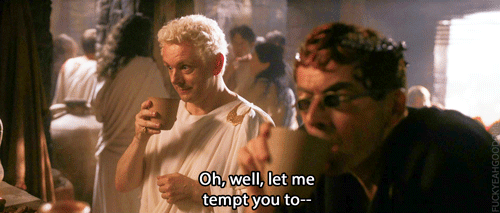
"Oh-- well, let me tempt you to--" Just consider this moment from Aziraphale's perspective for a minute...
Serpent of Eden Crowley? He is literally the spark that lit the flame of all of humanity here. By tempting Eve into free thought and sensual pleasure, he also empowered her into teaching Adam these things. As a result, Crowley is basically responsible for sex on Earth-- for all of its history. If you live in the Good Omens universe and you've ever had an independent thought, a sensuous experience, or an orgasm, you owe Crowley a thank you note.😂Every play Aziraphale has ever seen, every meal he's ever enjoyed, every human he's ever taken to bed-- all of those experiences are indirectly because of Crowley.
Aziraphale has wanted him for quite literally ever. He compares everyone else to him. No one else has ever made him feel like this. He knows they're attracted to each other but he never felt like he knew what, if anything, he had to offer Crowley. The hottest being he'd ever seen freed him from the prison of his own repression here-- what could he ever give Crowley that was worth something like that? How do you learn together and try new things and adventure together with someone who seems like they're leap years ahead of you and know all the things it took you a long time to find out?
It's at "I've never eaten an oyster" that Aziraphale realizes that the being who freed everyone else got left behind and Aziraphale can fix that. He is good at burning holes in prison walls. Protection and arming others against threats to them and healing and kindness-- that's what he does. He's been here thinking for ages that Crowley would never need anything from him that he knew how to give like this but now he sees it differently. They've shown each other already by this point that they're good at being partners but this one aspect of it always felt to Aziraphale like it would be imbalanced. In Rome, he realizes that it isn't.
Aziraphale doesn't have the vocabulary we have today for these sort of issues and Rome wasn't exactly a bastion of trauma-informed sex lol but he didn't need any of that because he's intuitively good at this. He already knows that it will be fine because Crowley doesn't know it yet but he effectively already told him that it will-- by telling him in the first place. Aziraphale knows that trust and desire are what's needed and that they have those in spades. All he really has to do here is help Crowley relax and get out of his head.
Or, as Aziraphale will put it during the 1941 sexual metaphor that is The Bullet Catch plot: "You do the shooting. I'll do all the hard bits."
What gets Crowley's attention in Rome is how utterly confident Aziraphale is. How empathetic but unpitying. Aziraphale doesn't hesitate and he trips over himself accepting the challenge-- which is awfully cute-- but it's that Aziraphale doesn't treat him like he's broken or seem to see this as daunting that works for Crowley. There is a lot of internalized shame and fear and pain associated with anorgasmia and Crowley has been stewing in this for a very long time up until Rome so for Aziraphale's response to be not dismissive of it but, instead, reassuring, was exactly what Crowley needed. Aziraphale's whole attitude is oh ok no problem should we get going now or..? While he was not happy about Crowley having had difficult experiences before because he doesn't like to think of him in pain, he was really into the idea of Crowley thinking it could be different with him.
Aziraphale really, really, really likes being the person Crowley let in enough for this. Pardon the Crowley pun here but Aziraphale has never stopped crowing about it between them in thousands of years and if Crowley weren't besotted with him, he would have murdered him over it by now. (See: an example in 1941 that we'll look at near the end of this meta and "I had to miracle in the cherries" in Good Omens: Lockdown.)
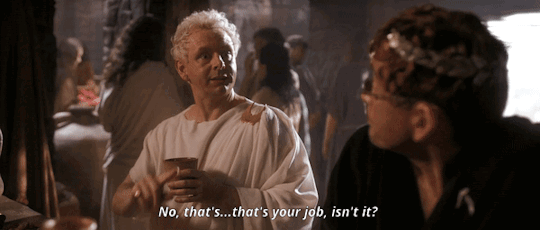
"No, that's... that's your job. Isn't it?" Aziraphale's use of "tempt" to offer Crowley sex is then something of a joke between them because neither of them are tempting each other in a demonic sense of the word at any time. They find each other tempting though, in the sense that they find each other attractive. To use "tempt" with one another is just to ask each other if they are in the mood for something, not to influence the other into doing anything ("tempt you to a spot of lunch?" and "temptation accomplished" in 2019.)
This is really established first in the Job minisode, chronologically, as Crowley didn't so much tempt Aziraphale to try the ox ribs so much as he just offered them to him and Aziraphale decided to without influence. The same is true for Crowley choosing to try sex with Aziraphale in Rome-- he's really already chosen to by not saying no and that's all before Aziraphale's "well, let me tempt you--".
When Aziraphale replies to Crowley's reaction to the "tempt" line with "No, that's... that's your job. Isn't it?", Aziraphale is teasing him a bit. He's saying he sees through Crowley's massive control issues and that he gets him. You always have to be in control but you don't always want to be. Well, today's your lucky day, Bildad, because we're partners in this now.
Or, as it's known in 2023:

Flame burning pink as Crowley smiles a little for the first time in the scene:
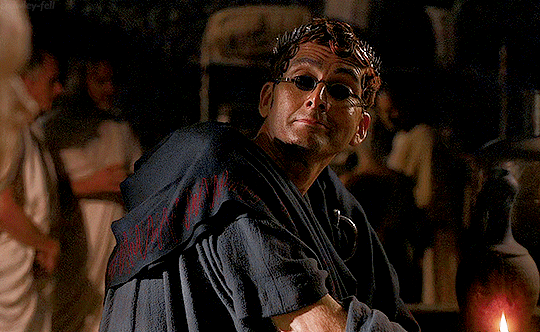
"Oysters! Oranges!" What Juliet (the woman selling snacks) calls out as the opening dialogue in the 1601 scene to entice prospective buyers, the only one of which really is Aziraphale. Oysters-- aphrodisiacs. Oranges-- cinematic symbol of death. Aziraphale chooses...
"Some grapes please! They look scrummy." Grapes. Fermented grapes are wine. Wine is alcohol. Alcohol is sex. We haven't a need for oysters anymore and we shun symbolic death in favor of the little death. The grapes look "scrummy", shortened version of "scrumptious", meaning both "delicious" in food terms and "sexy enough to eat" in people terms. Aziraphale eats them in front of Crowley during the scene.
Oysters. What Crowley and Aziraphale had in ancient Rome.
Oysters. What Crowley and Aziraphale had in ancient Rome.
Oysters (in Ineffable Husbands Speak). Both an aphrodisiac and an orgasm, but...
...since they don't want to bring up anorgasmia every time they're flirting or talking about sex for the rest of their very long lives... and since oysters on their own are really hard to work frequently into conversation and would get a bit old pretty quickly, they need another word.
So, based on what we've seen in the series, it evolved into...
Oysters = Fish.
Fish live in the ocean, amongst other sea creatures.
Fish & sea creatures (in Ineffable Husbands Speak). An orgasm.
Anything related to the ocean (in Ineffable Husbands Speak). A metaphor for sex.
If it is in or lives in water, it's prime material for climatic innuendo. If it has multiple meanings in English? It will be used frequently as part of wordplay. If it pertains to the ocean or lends itself to destructive adjectives (shipwrecks, sea monsters, bubbling seas and rising waves), it will absolutely be a sexual metaphor at some point.
Such as...
Wahoo. A kind of fish. Also: an exclamation of joy. For obvious reasons, Crowley and Aziraphale's favorite fish joke.
In 1941, Aziraphale seeks feedback in the dressing room on their sexual metaphor Bullet Catch performance-- that they are both more than aware of-- and Crowley agrees that it went well and dryly suggests they "chalk up a win for the side of the angel", turning the common phrase that is usually "...side of the angels" singular to reflect only Aziraphale, who is over the moon that Crowley enjoyed it and cheekily replies "wahoo!" before their flirting is interrupted by Furfur.
Decades later, Crowley gives another stellar performance-- the full, epic saga of his M-25 Orbital Disruption-- to the joyless, miserable lot in Hell and concludes it with a line that he plans to tell Aziraphale later to make him laugh:
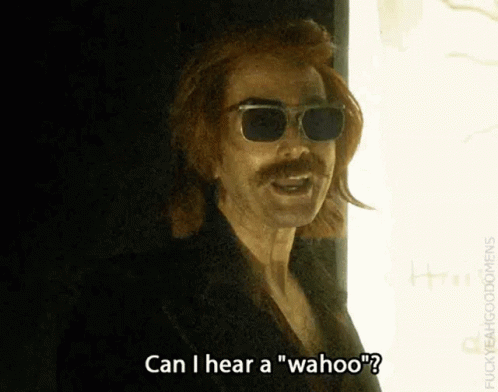
Carp. A kind of fish. Also means: to stand around and bitch. Aziraphale telling Crowley to stop standing around getting off on grouching and go get Maggie and Nina for The Meeting Ball in S2.
Gravlax in Dill Sauce. Cured salmon. This one is special and we'll look at it in the Dill Sauce meta about the St. James Park scene soon.
Ducks. Waterfowl. Aquatic birds. This is long enough. 😂 They are a whole separate meta.
Pickled herring. A kind of fish, cured in salt. What was dumped out of the barrel by Elspeth in The Resurrectionist minisode so she could use the barrel to transport her corpse. Crowley and Aziraphale spend half the minisode dragging around a barrel that should contain fish (the little death) but actually contains a corpse (actual death)-- foreshadowing the fact that their date will end with Crowley dragged to Hell and the start of the holy water arc of misery for them.
Red herring. A dry, smoked fish that turns red as it is smoked (ooh la la...) 😉 Also: A literary device, in which something is established with the intent of it distracting the audience from something else in the story. Elspeth and her pickled herring barrel are a red herring that changes The Resurrectionist minisode story from what the audience thought it would be into what it is, distracting the audience from the fact that the story actually began with Crowley and Aziraphale meeting in a graveyard at midnight for... ah... reasons. Aziraphale also turned 'red'-- turned to Crowley's side-- during the course of the episode, even as his shot at getting him some "pickled herring" that evening went up in hellfire smoke.
"Sargeant Shadwell." The hilarious, Sean Connery-esque way that Crowley said Shadwell's name in 1967, made funnier by the fact that a shad is a type of fish... and part of the herring family and this scene itself is a red herring. It misleads the audience into thinking we have a whole new plot about Crowley leading a break in to a church that is rendered inert within a matter of minutes when Aziraphale gives Crowley holy water. Shadwell's name is basically 'Fishwell' and, for Madame Tracy's sake, I hope that's true and not ironically funny. Either way, doubtful that Crowley and Aziraphale haven't joked about his name before. Shad also phonetically sounds like 'shag', the British slang word for fucking, and Crowley's tone of voice in the scene had a ring of 'shag' connotation to it.
Kieler Sprotte/Kieler Sprotten. A German smoked herring dish. A hidden reference in the Baraqiel entry in 'The Demon's Guide to Angels...' book that Furfur had in 1941. Baraqiel is Crowley and the entry, based on what's in it, was written by Aziraphale. One of you requested a meta on Baraqiel so that's on deck for now.
Newt. A semi-aquatic salamander. They live in the water but only some of the time. Also: Newt Pulsifier, an extreme parallel of Crowley who breaks all technology he touches, loves his less-attractive-than-The-Bentley car, and falls for a being who has issues with the purpose they feel they were put into the world to fulfill. Newt gets "in the water," metaphorically-speaking, when he has sex for the first time in S1 with the Aziraphale-paralleling Anathema, which is another example of how he's a more extreme version of Crowley, whose parallel to Newt is Aziraphale helping him through his intimacy issues.
Flounder. A kind of fish. Also means: to struggle helplessly in water. "To flounder" is frequently confused with "to founder", which is wordplay intentionally being used by Aziraphale in the "Seeds of Destruction" scene in S1, which we'll look at in the requested Seeds meta soon.
Bananafish. A kind of fish. Also: the first two words of Aziraphale's magic words. Is it "bananafish" or is it "banana, fish"? It's a little unclear and possibly situational. It's also likely both and a reference to wordplay and sex via fish. "The Bananafish" is also a short story by J.D. Salinger about trauma, PTSD and suicide that correlates to S2 quite a bit but we can look at that in a more Aziraphale's-trauma-centric meta.
The 'drunk-in-the-bookshop' scene. Part of the 2008 minisode, in which Crowley and Aziraphale are drunk and talking on the surface about Armageddon but are actually flirting with each other using sea-related terminology to make some drunken sexual metaphors.
Whales and dolphins. Sea-dwelling mammals. Not fish but live like them, alongside them. Damn big brains. Whales, in particular, are their own metaphor in Good Omens-- above and beyond Ineffable Husbands Speak-- but, in this context, they are non-fish creatures that live in the ocean, so Crowley is equating himself and Aziraphale to whales and dolphins in the drunk-in-the-bookshop scene and calling Aziraphale smart and clever in doing so. He is too drunk to come up with how smart they are ("brains the size of... *gives up* damn big brains" lol). His point is that Aziraphale is so smart, which is so hot, and that's his point. Brain city, whales.
Off of this, a drunk Aziraphale has heard Crowley say "damn big brains" and is thinking you know what *else* is big, Crowley?

"Kraken! Oh, great, bigggggg bugger..." Totally plastered Aziraphale is undefeated at Completely Wasted Wordplay, though, and he has a mythical monster and a whole attempt at a sexual metaphor for Crowley here, thanks to whatever brain cells are still kicking around in his damn big whale brain. The Kraken is huge and we aren't just talking about smart anymore, nope... Adding to the humor is the use of 'bugger'-- The Kraken is a massive one and we're talking about both in size and in terms of quite extraordinary amounts of buggery that Aziraphale wants to get up to here...
Giant squid and octopi. Also not fish but live in the sea, much like the whales and dolphins that Crowley had just mentioned and probably one of the reasons why Aziraphale's mind then goes towards The Kraken.
The Kraken. Mythical sea monster from Norse mythology. The Kraken-- and sea monsters, in general-- are thought to be based on giant squid and/or octopi. Particularly before days when squid and octopi were understood, The Kraken was sometimes described as a "sea serpent". Crowley, in Aziraphale's sexual metaphor here, is The Kraken-- is the great, bigggg bugger who is:
"Supposed to rise up-- right up-- to the surface. At the end. When the sea boils." We're talking about Armageddon on the surface but we're talking about sex under the surface and The Kraken is a mythological being who does not exist, making this drunk conversation even funnier. Adam will manifest The Kraken into existence later on in the season-- but, prior to that, the actual Kraken was a myth. Aziraphale and Crowley both know that. Neither of them believe in The Kraken-the-sea-monster. Aziraphale is just using it as a joking sexual metaphor while they're drunk as all fuck to flirt with Crowley using their whole ocean-themed innuendo.
"The Kraken" is "supposed to rise up, right up, to the surface, at the end". The sea serpent going from the depths of the cold black sea to cresting the surface of the ocean at the end of days, which is Aziraphale using destructive sexual metaphor-- using disaster, death, apocalyptic terminology, etc. as a metaphor for sex. Armageddon is the end of days is a sexual climax. "The Kraken" rises to the surface of the ocean "at the end-- when the sea boils"-- when it becomes too hot and there's no other choice but for the sea serpent to come... to the surface. 😉
"There is a lot of 'underlying unspokenness' and it comes to the surface now and again." Michael Sheen quote describing the nature of Crowley and Aziraphale's relationship in S1 in the interview below. I'd bet serious cash he's specifically thinking about The Kraken scene.
Thanks to @procrastiel for showing me the interview.
youtube
"Well, that's mah point! Dolphins and whales-- whole sea bubbling-- hard to keep everybody from turning into bouilla--" Crowley's response to Aziraphale's The Kraken metaphor. Actually surprisingly witty at the start considering how drunk they are (it's their damn big whale brains hitting on something every few words lol.) It is, indeed, his point that Aziraphale is talking about-- his boiling point-- but Crowley uses "point" in the other meaning here as well (as in, "that's the point of what I was saying!").
"Whole sea bubbling-- hard to keep everybody from turning into bouilla--" Everybody, eh, Crowley? 😂I thought we were talking about fish being boiled in the end of days here? (Someone ought to get Crowley and Aziraphale to make videos explaining climate change lol.) These fish and dolphins and whales seem like they could be easily mistaken for people? Like, say, you and Aziraphale, hmm?When the whole sea gets bubbling and it's just too hot in here, it might, indeed, be hard to keep you both from turning into...
Bouillabaisse. A fish soup that is frequently referred to as a fish stew, which is what a drunk Crowley calls it. The dish is French and when Crowley is too drunk to get the word out, he keeps repeating the first half of it-- "bouilla"-- which comes from the French verb "bouillir", which means "to boil". He heard Aziraphale's "when the sea boils" and his mind took it to the fish joke of bouillabaisse. To boil is, of course, to cook something in very hot water.
Crowley is too drunk to get the word out in full and repeats the "boil" part of it, getting distracted at one point and calling Aziraphale "baby" while they make hilarious, drunk, kissy faces at one another, before redirecting it with "fish stew-- anyway! It's not their fault."
A bouillabaisse features at least two different kinds of fish cooked together and served alongside one another in the same bowl.
Bouillabaisse/A fish soup or stew (in Ineffable Husbands Speak). Climaxing together/simultaneous orgasm.
"Fish stew-- anyway! It's not their fault." The end of the 'bouillabaisse' portion of the scene and yes, it's not the fault of the actual fish that will be turned into bouillabaisse when the world ends but this is also Crowley thinking of Aziraphale's earlier "hereditary enemies" comment and saying again that it's not their fault, they didn't ask for this. Tossed drunkenly into this getting sloppy sexual metaphor, it's pretty funny as it's also saying wouldn't be their fault if they turn into bouillabaisse later as who could blame them? World ending, been waiting for days, bouilla bouilla baby...
youtube
Good thing they sobered up because they were one more bottle of Chateauneuf-de-Pape away from just speak-singing "Under the Sea" at one another. Even the sturgeon and the ray, angel! They get the urge and start to play! That's *mah point*... 😂
"Heaven will finally triumph over Hell." One of the coded things that Aziraphale said to Crowley in the 1.01 St. James Park scene. While the surface layer of this conversation is about Armageddon, they're actually talking on the hidden layer about having not been able to be together the prior night. The key bit to this that I'm mentioning here is the use of the word "triumph"...
Triumph. A triumph is obviously a great victory or success but the history of the word is interesting. It originally meant a victory parade-- a processional-- held for a victorious general upon his return to ancient Rome. It was exclusive to Rome for a time as a word and still is how historians refer to that type of processional.
By using "triumph" in the St. James' Park scene, Aziraphale correlates the would-be sushi night with Rome.
Sushi. Raw fish mixed into vinegared rice, along with other ingredients. What Crowley and Aziraphale usually go out for in the modern era on their unofficial anniversary, which is the date of the first time they had sex in ancient Rome.
1,967. The number of years between the first time Crowley and Aziraphale had sex and when they were trying to meet to celebrate that special occasion in 2008 in 1.01. Armageddon: Round One began on their 1,967th anniversary. A reference to:
The 1967 scene, in which they talk about their relationship, and "dine at The Ritz" is said.

41. The number of years between Aziraphale suggesting they could one day "dine at The Ritz" in 1967 and when they did for the first time in 2008. A reference to:
The 41 A.D. scene in Rome, which shows how they first became lovers.
Well, with one caveat...
Hellfire and Holy Water. Substances produced by the physical corporations of angels and demons which are lethal to one another's "opposite kind"/"enemy." Aziraphale's body can make Holy Water, which could liquidate Crowley into non-existence. Crowley's body can make Hellfire, which could burn Aziraphale into the same.
As such, they spent some time concerned that each other's, em, "hellfire" and "holy water" might be harmful to one another, until they disproved this theory. This historical HIV allegory is alluded to in the "angel-demon, probably explode" Discorporated!Aziraphale scene in S1 (to "explode" also meaning to "explode a theory"-- to disprove it) and also in this scene here, in The Big Damn Sexual Metaphor that is The Bullet Catch:
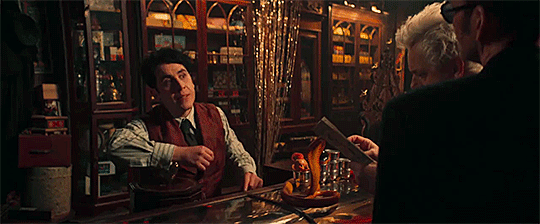
Aziraphale's dry "just aim for my mouth but shoot past my ear," right?
So, how did they figure out that they wouldn't kill each other?
Kingdom of Wessex. 597 AD. The Camelot scene. Crowley and Aziraphale cross paths in the time of King Arthur and are so damn over canceling each other out at work. After Aziraphale rebuffs Crowley's initial proposal of basically quiet quitting Heaven & Hell-- just doing the paperwork and phoning it in-- because he thinks Michael will figure it out (not because he doesn't want to lol), the two part the scene without a resolution... but the 1601 scene provides that resolution for us via the reveal of The Arrangement.
Back in 597 A.D., after the scene we saw, Crowley and Aziraphale got creative in trying to find a solution to their work woes and wound up experimenting with what they had been told by Heaven regarding what their capabilities were. They uncovered that Crowley could still do blessings and Aziraphale could do temptations. So long as they kept pulling power from their respective head offices, it didn't matter what type of miracle they did and no one in Heaven or Hell figured it out. This then caused them to also realize that if they were biologically similar enough to be able to do the same miracles, then odds were high that they actually wouldn't hurt one another if they had more expansive sex and they decided to try it. They're both still here so obviously the end result was nothing but wahoo. What else is suggestive of this besides the already mentioned scenes? This one, in 1941:
Excalibur. King Arthur's sword. Excalibur's Chest. The famous swords-in-the-box magic trick, on sale at Goldstone's in 1941. Swords are as much sexual metaphor as guns. Note what's between them in the magic shop in 1941 when they agree to perform The Bullet Catch together that night, after a performance by The Ladies of Camelot:

This is part of the reason why they also use performing miracles as innuendo-- besides the fact that there is just a lot of material there lol. It's because it took them 556 years after Rome but they happened into figuring out Heaven's big secret and it freed them to boff each other senseless for the last *maths* 1,426 years as of S2 lol so it's kind of irresistible. An example is Aziraphale in S2 with "the 25 Lazari miracle you and I performed together the other night" which is on the surface, sure, about the miracle they did together to protect Gabriel but which Aziraphale makes actually sound like what they got up to the other night, probably the one before Gabriel arrived. He's talking about Muriel there for the Gabriel miracle but he's saying it with a tone of: I suspect that the angel is here to verify the miracle that was Sunday night. I'd imagine alarm bells must have been ringing in Heaven constantly since. You and I raised the damn dead, old serpent...
The Bullet Catch. A sexual metaphor for both "firsts"-- 41 A.D./Rome and 597 A.D./Kingdom of Wessex-- mashed together because they were similar... but also a metaphor for Crowley and Aziraphale's relationship overall.
The Bullet Catch requires them to trust one another and be vulnerable with one another. It's only possible because of how much they trust in and care for one another. Crowley's ability to fire the gun in a way that won't kill Aziraphale-- which Aziraphale is trusting him to do-- means that Crowley has to trust himself to do it. He has to believe himself capable of it and that he can relax enough to do it. He only believes this because Aziraphale believes it about him and makes him feel safe enough to focus. Aziraphale's trust in him allows Crowley to trust both himself and Aziraphale while Aziraphale's trust in Crowley allows him to let Crowley in enough to let him see his insecurities and be loved in spite of them, something Aziraphale's self-doubts and imposter syndrome keep him from doing with other people. Crowley knows he's imperfect and loves him madly anyway, something Aziraphale has trouble doing with himself and which no one else in Heaven ever has. Crowley's faith in and love for Aziraphale give Aziraphale the confidence to live more freely and feel like he's among the professional conjurers and not just on the outside of life. Their trust in one another helps them trust each other and that self-trust opens them up to experiences with each other that lead to ever-deepening trust of one another that lifts them both in a kind of feedback loop.
"Cheers for, um, getting me off the hook." Crowley thanking Aziraphale for helping him with the Mrs. H situation. He's more than aware that Aziraphale assisting with Crowley's broken alcohol bottles when alcohol = sex to them is more than a little metaphorical for their actual history and he chooses a fish reference as part of the thank you. "Cheers" is that British way of saying "thank you" but it's also obviously what people also say as a toast (which is also a word used to refer to warmed bread, which is also related to partnered sex in Ineffable Husbands Speak.) It's what Crowley actually says in 2019 at The Ritz at the end of S1 in the "Cheers. To the world." moment. Here, it's also a reference to the first time they did clink some glasses together in toast-- the "Salutaria" of ancient Rome. And what is this toast-y thank you of Crowley's for? For getting him off-- that is, for getting him "off the hook."

"Off the hook" refers to a caught fish being taken off the hook. It also became, over time, a phrase referring to communication, from the days of phones with cords. Leaving a phone "off the hook" meant that calls couldn't come through and communication couldn't be had. By 1941, the phrase would have roots in both origins and if we're talking about fish and telephones, we're talking about earlier in the evening in 1941 but we're also talking what it referenced to them symbolically about the past of their relationship. It is also absolutely why Aziraphale jumps on The Bullet Catch as his grand gesture once they get to the magic shop-- he sees a way to continue the metaphor that they're both more than aware of.
It also makes it a thousand times funnier then that poor Aziraphale essentially makes the same assumption about demonic life twice over a bazillion years apart. He thought The Bullet Catch would be a no-brainer, fun thing for them to do because he assumed that Crowley had fired a gun before, only to discover that this was now actually Rome all over again because while Aziraphale has a firearms license and a Derringer hidden in a hollowed-out book in the bookshop, this metaphor was suddenly way too on point because Crowley hasn't fired a gun with someone else around before-- in this case, at all, actually. His dry as all fuck "not as such" response to Aziraphale is well, we both know I've fired the metaphorical gun this rifle is standing in for here but yeah, no, I have no idea how to shoot this thing and I was going to miracle you safe and now those aren't working either so I have to do this for real and I'll just be over here trying not to have a panic attack...
Talking. Making sure the telephone is not off the hook is obviously always a good thing with everyone one trusts around them in life. In a relationship context, feeling safe enough to talk openly with your partner about things which make you feel vulnerable is the mark of a trust and what allows for deep intimacy. Talking in bed-- not just checking in with a partner but talking beyond that-- is a therapeutic intervention for anorgasmia, as it helps someone suffering from it to stay present in the moment. Tends to work in general but even more so if the person involved likes chat in bed as a whole, which a couple of scenes suggest Crowley does (the evolution of it into also some extra spicy chat in the "Seeds of Destruction" scene in S1 and his self-deprecating "you just say 'blah blah blah'" moment in S2.)
"We need to talk." What Crowley says in 1.01 when he calls Aziraphale from a corded public pay phone. This is the first time that Crowley and Aziraphale talk in the present, even if they're in separate locations, and the first time we've seen them interact since the opening scene of the show of them on the wall in Eden. We've spent the first part of the 2008 minisode re-introduced to them separately, not yet fully aware of how they were supposed to be together during it. Crowley doesn't wait until he's back in Mayfair after dropping off the antichrist baby-- he calls Aziraphale from the nearest payphone. He says "we need to talk", a phrase that is, for many, a relationship cliche that comes with a sense of the foreboding but we will learn from this scene also means other things to them.
For one thing, it's a code phrase that automatically triggers them to meet the next day at noon at St. James' Park. If one of them calls and says they "need to talk", they know that it means to meet the next day and when and where. This one they know a lot better than their four million alternative rendezvous spots, as we saw in that other scene in S1 when they set up meeting in the bandstand over the phone. Because it triggers St. James' Park, it means that the initial talk will be all coded in their hidden language, as that scene in 1.01 was, but that is also a form of communication for them and a kind that they actually enjoy.
For another thing, it means that they need to talk in general-- that something is happening and they need to talk about it, as was the case with Armageddon. At the time that they have this phone conversation, they don't yet know that one another already knows about Armageddon starting. We know from all the contextual clues we've already looked at here that they were supposed to be having dinner together earlier and that they also can't say that over the phone so when Aziraphale says: "Yes, I rather think we do. I assume this is about....?" there's a dryness to Aziraphale's tone because a form of talking was already on the menu. Sushi night is Rome and Rome had talking so, yeah, Aziraphale rather does think they need to talk-- to fuck-- and also Armageddon just started so they'll need to actually talk-talk about that as well at some point.
Crowley's response to what it's about, though, is destructive sexual metaphor. What do they need to talk about, on all levels, summed up by Crowley in a word?
"Armageddon." Armageddon: the actual end of the world and Armageddon: their big damn anniversary sex. The Big One. It's an apology of sorts for Hell detaining him and a request that they meet tomorrow.
The scene ends with Crowley placing the phone back on the hook-- indicative of understood, secure communication, the likes of which will be on display in the following scenes of the 2008 minisode.
Talking (in Ineffable Husbands Speak). Both verbal communication and physical communication. Talking means speaking. Talking also means making love.
"Trust me." What Aziraphale mouths at Crowley in 1941 to get him to be in the moment enough to be able to fire the gun. Absolutely one of the things Aziraphale said to Crowley to help him relax in Rome.
"I knew you'd come through for me. You always do."

Aziraphale pouring Crowley another glass of wine (and alcohol = sex) and the wordplay kink out here in full force as there are three levels of meaning happening at once. Surface level is about their success with The Bullet Catch earlier in the evening. Aziraphale knew Crowley would come through for him-- "come through" in the sense of he can always rely upon Crowley to be there for him when he needs him to be.
To "come through" something, though, is also to get through to the other side of something-- to have been able to pull through a difficult time or a struggle-- and refers to Crowley always coming out of dark periods and not giving up. But there's really also the third meaning, which is just the direct innuendo:
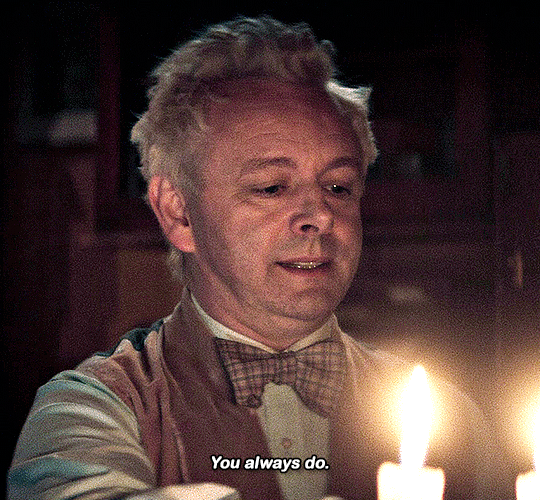
Some serious 'tone of voice' at play in this bit here performing a little magic trick and making that 'through' disappear right out of first sentence lol, turning it into: I knew you'd come for me. You always do.
Aziraphale's never going to stop being thrilled at their Roman triumph here and is still happy to remind Crowley in 1941 that they both know Aziraphale just does it for him.
"Well, you said 'trust me', so..."
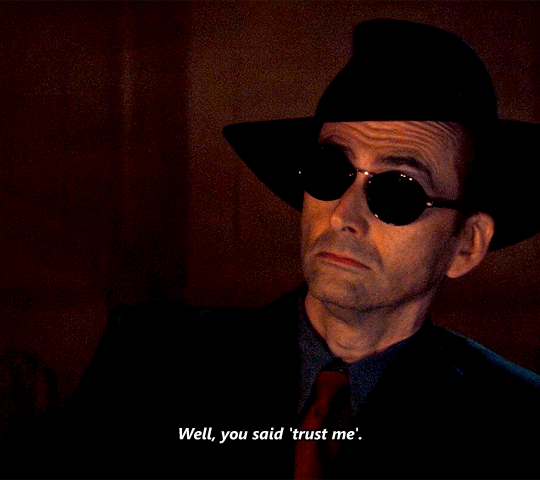
Just prior to this, Aziraphale had been telling Crowley the magic words he silently said to keep the photo of them from Furfur (more fish-- "bananafish").
"Well, you said 'trust me'..." is Crowley saying "well, you said my magic words, so..." Aziraphale invoked Rome and talked to him so he got there.
"And you did." And Crowley did trust him, so it worked.
Aziraphale, though, is not just thinking about earlier that night in that moment in 1941 when he's staring off, reminiscing, before looking at Crowley like that...
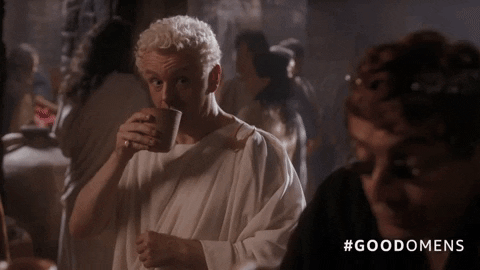
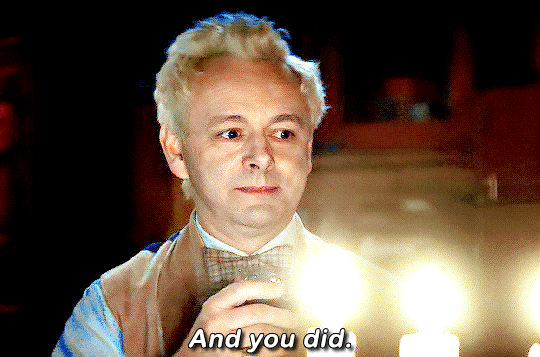
...he's thinking about Rome.
"To drain the whole sea/Get something shiny..." Lyrics from Hozier's "Take Me to Church", pretty uniformly agreed as the most Crowley song that has ever Crowley songed, and which is on his official playlist in S2.
Pearls. The shiny things found in the sea. The jewels harvested from within the opened protective shell left behind by emerged oysters.

The original post referred to a bit in this one:
#ineffable husbands#ineffable husbands speak#good omens#good omens 2#good omens meta#aziracrow#crowley#aziraphale#spicy omens#tw sa#tw trauma#tw ptsd#crowley x aziraphale#aziraphale x crowley#long meta
186 notes
·
View notes
Text
you know what? the bodysnatching in edinburgh minisode is still my favourite flashback out of them all. i know we all love bildad and 1941, but there's something about the 1827 flashback that just speaks to me more.
crowley taking aziraphale to the graveyard just because he thought he'd be amused by the statue of gabriel that just so happens to double as a romantic date? the depiction of bodysnatching in a neutral/logical way - acknowledging that it's a shitty thing, but a shitty thing that needs to be done for the advancement of medicine? getting to see aziraphale's moral compass and how he sees the world adjusting in real time? crowley dressing in the latest fashions with his hair styled in a lord byron-esque way? i love all of it so much
#*my wittering#good omens#ineffable husbands#crowley#aziraphale#aziracrow#crowley good omens#aziraphale good omens
175 notes
·
View notes
Text
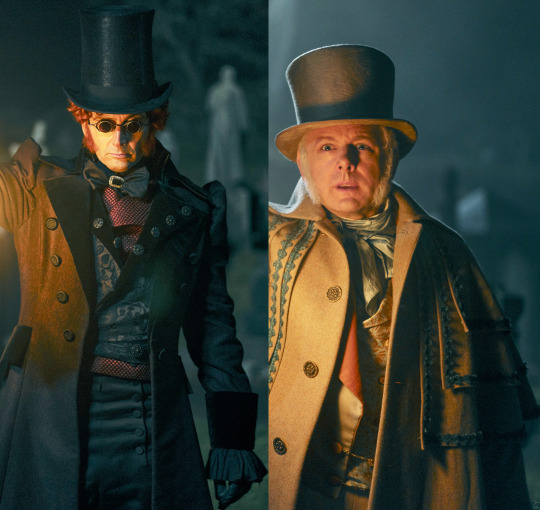

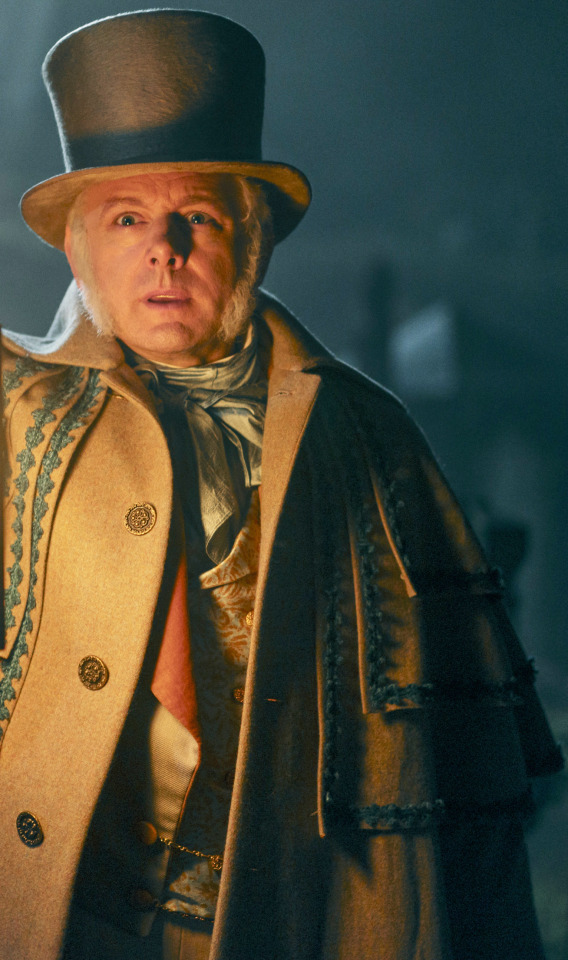
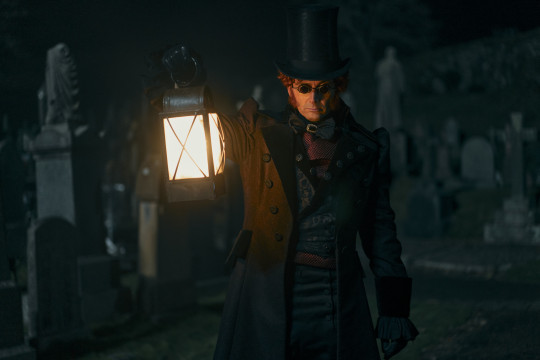
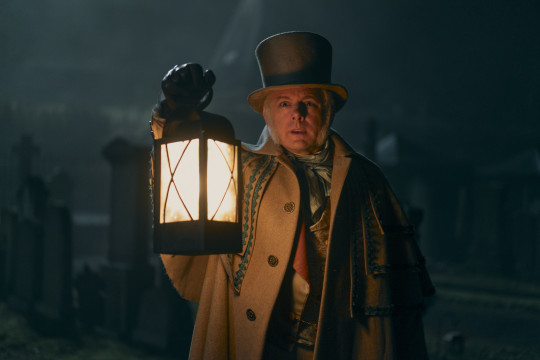
Just looks at them! The 1827 costumes are soo beautiful! :)❤ (I lightened the first picst for more detail, the last two are unchanged! :))
#good omens#photos#promo photos#show promo photos#hq photos#david tennant#michael sheen#crowley#aziraphale#2ep3#1827 minisode#2i3i6#costume reference#the costumes are so goood <3
2K notes
·
View notes
Text
"Stunning View" Teaser
Embracing
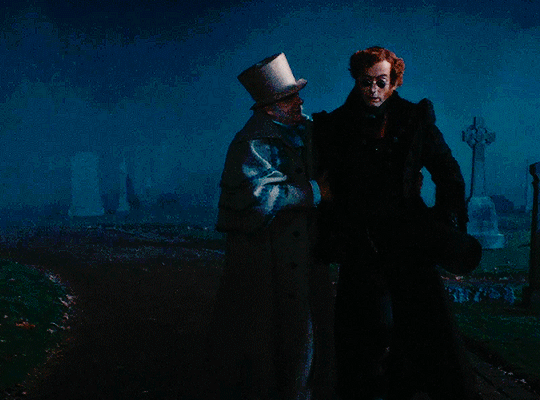
Crowley's breath caught in his throat as Aziraphale's arm snaked around his back, gripping the demon's waist tightly in order to steady and guide him as they walked along the path.
Despite the many layers of clothing between their bodies, Aziraphale's touch opened an emotional well that bent around Crowley's perception like a gravitational lens, distorting the world and penetrating the laudanum fog until all that remained was an exquisitely amplified focus on Aziraphale's touch - the angel wasn't just steadying him, he was embracing him.
"Stunning View". Fanfic Thur, May 16th; Ineffable May 2024 prompt "1827".
#stunning view#science always belongs in fanfiction#good omens fanfic#romantic fluff#my posts#good omens 1827#good omens minisode#the resurrectionists#ineffable may 2024#aziracrow#ineffable husbands#ineffable idiots#for science!#astrophysics
58 notes
·
View notes
Text
tfw you invite your boyfriend work acquaintance on a spooky date to a cemetery in Scotland. 😁
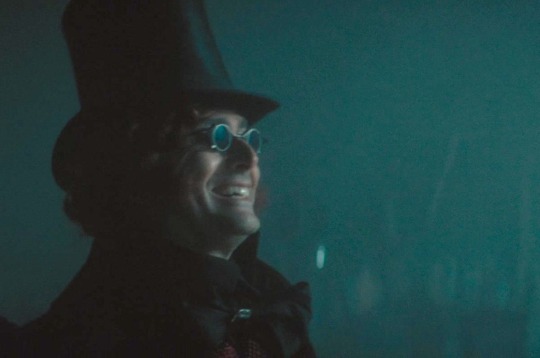
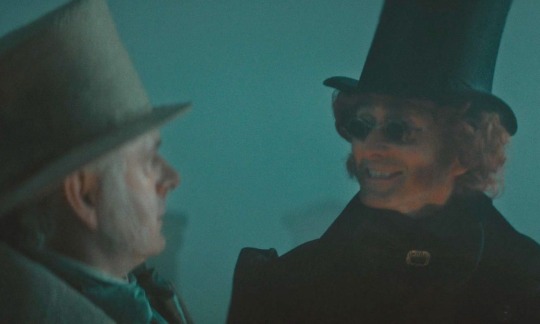
#he's so smiley! he's having such a good time!#big spooky fan#crowley#1827#something about how Crowley smiling at Aziraphale in such an unguarded way can be so personal actually#good omens#good omens s2#good omens 2#the resurrectionists minisode#the dw trailer was making me sad but this helped#david tennant#a duck talks
121 notes
·
View notes
Text
Every single minisode is Aziraphale's memory, and why that's [not?] important
There is extensive meta-analysis, my own included, that Before the Beginning is a doctored memory resulting from erasure of Angel!Crowley, and that the trace of him that is left in Aziraphale's memory is the Starmaker, so that this is what we see at the opening of S2. With this foundation of "some scenes are altered memories," we can critically examine the minisodes and see that, in fact, they are ALL Aziraphale's memories that are potentially subject to doctoring.
Evidence (and exploration) below the cut:
A Companion to Owls
The largest part (S2E2 22:10 to 44:00) Book of Job flashback is book-ended by Aziraphale leaning over the physical Book of Job in his bookshop. We enter the memory when Aziraphale enters it, we leave it when he leaves it. Pretty straightforward.
The Ressurrectionists
Similarly, in S2E3, we begin the first flashback to 1827 with Aziraphale's "dear diary" entry. We flash out each time to Aziraphale: in the car to Edinburgh, getting out of the car at the Ressurrectionist Pub, and with Aziraphale staring up at the statue of Gabriel while standing in the graveyard in Edinburgh, respectively for each of the three flashbacks. This all strongly indicates that we've been in his memory.
Nazi Zombie Flesheaters
I didn't even notice until I was doing research for this that basically the entire episode takes place in 1941. From the end of the main title at 5:00 to 37:50, we never come out of the 1941 story. But what is interesting is what bookends this minisode.
Before the main title, Shax has tricked her way into Aziraphale's car and alludes to a time when a rumor started about our ineffable husbands:
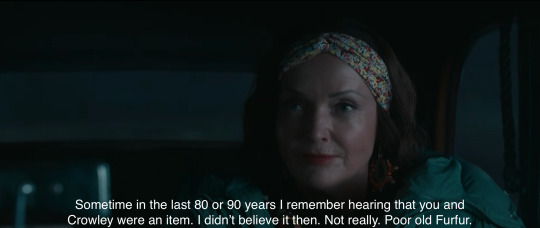
Sometime in the last 80 or 90 years I remember hearing that you and Crowley were an item. I didn't believe it then. Not really. Poor old Furfur.
And when we flash back to modern day, we first go to Hell with Shax proposing a full frontal assault on the bookshop, and then we get:

Aziraphale has arrived back in SOHO, and has spent the 8 hour drive reminiscing about what Shax alluded to.
But this part gets even weirder. Because the final line of the episode is:

You're really hosting the meeting?
Absolutely! And I can guarantee you: it will be a night to remember!
What this means in context of the 3 memory sequence
This line has been taken by a lot of analysts as a reference to A Night to Remember by Walter Lord, a collection of first person accounts of passengers of the Titanic. Most notably, the thematic ties of this work to the cinematographic design of Good Omens are captured by this quote:
A key to Lord's method is his technique of adopting an unconventional approach to the chronology of the event, "[taking] an imaginative approach to time and space in which hours and minutes prove extremely malleable, the ship itself seems almost infinitely complex, and the disaster assumes order and unity from far away."
Which is an amazing connection, and probably true, in that it was a deliberate reference by the writers. "Malleability of time and space" describes well how this show is put together for us the viewer. But it also illustrates how Aziraphale experiences his relationship with Crowley; skipping over centuries at a time, while dwelling on and protracting intimate moments spent together, create a cohesive whole when viewed from a distance. That whole is their relationship. [Which is about to go down like an unsinkable ship.]
But absent the literary reference, we could even take this line for its literal meaning. Aziraphale is talking about forming new memories, after we have spent the last three episodes living in his memories of times with Crowley that were key to shaping their relationship. This isn't a S1E3-style series of allusions to a furtive, flirtatious, and organically blossoming intimacy; these are rough events where the two are shoved into moral quandaries and forced to make some really difficult decisions that bring them closer together and define "their side." These are core memories, and incredibly precious to Aziraphale. And now, after a few short days in which he has spent a lot of time ruminating on these intense memories, he is embarking upon the task of making another important memory, that is, dancing with Crowley.
Why We Care
Because memories can be altered, all of the information we get from these episodes is subject to a reliable narrator problem. As of the Gabriel trial, we know that memories can be doctored even when the person in question isn't present. Crowley knows that his memories have been removed or altered, and has put painful effort into retrieving them. Aziraphale may not realize that he has suffered the same fate. These memories that he holds so dear might not even be true.
Memory, Identity, and the Relevance of Fidelity
We would probably expect to get some "corrections" to these memories in S3, to see exactly what kind of manipulations our heroes suffered and what that reveals about the motivations of the perpetrators. That's how a paranormal mystery story with a memory manipulation element would normally proceed.
But it will be even more significant if we don't; it would speak to a philosophy-of-self that you are not the product of your objective past, but of what you remember, and so we don't get to know what actually happened because it doesn't matter to informing us about who Aziraphale is.
Aziraphale's love for Crowley springs from what he remembers about their shared past; it doesn't necessarily matter that the memories aren't true, because the love is.
~~~
I realize that I kinda buried the lead, so if you reblog, please tag appropriately? I'm taking suggestions.
If you want to read more on this topic, this meta by @ineffable-suffering is a good place to go.
#good omens#good omens 2#good omens meta#aziraphale#crowley#memory#good omens memory#erasure theory#ivoc
259 notes
·
View notes
Note
hello there! do you have any fics following the s02e03 minisode where crowley and aziraphale spend a little more time together before crowley is dragged down to hell? thank you!!!
Here are some for you...
Just this once by cricri (T)
It would have been funny if Aziraphale hadn’t been quite a bit worried. Constitution of an ox, you bet. So laudanum didn’t discorporate demons, but he wasn’t sure if Crowley had known that before he drank it. And discorporation wasn’t a nice thing to experience, all the paperwork and … well, he was rather attached to Crowley’s corporation. Somehow. Something about knowing the other in that form for a long time and getting used to it. He just didn’t do well with change!
A Bottle of Truth by theslightlyobsessedwriter (T)
It's 1827, in Edinburgh, and Crowley has just finished off a bottle of laudanum. It doesn't kill him; however, it does bring to the surface some interesting habits, some hidden desires, and some truths that he never thought he'd share with anyone, let alone the angel he's desperately in love with. Aziraphale is losing his mind and rather wishes Crowley would develop some self-preservation instincts.
Or: Crowley is off his head on laudanum, Aziraphale is his very enthusiastic caretaker, and they both love each other more than they can possibly say.
like rain that you slept through by bluphaelion (G)
Crowley’s good deed in an Edinburgh graveyard goes unnoticed by Hell (for now). In the meantime, it’s up to Aziraphale to take care of a very drunk, very clingy demon.
A Doll's House by CopperBeech (T)
For a moment, in that graveyard outside Edinburgh, it looked as if Crowley'd been pulled abruptly back to Hell.
Then Aziraphale realized the laudanum just hadn't quite finished with his friend. Which would mean helping him cope with an entirely different predicament. One that the angel chose not to trust even to his diary.
Constitution of an Ox by Bazzpop (T)
Laudanum; who would have guessed that such a tiny bottle of the stuff was potent enough to make a demon go arse over tip?
Aziraphale surely hadn’t (and neither had Crowley, apparently, else he would have dumped the drink into the nearest empty crypt instead of necking it like a shot and smashing the glass like a git) but, nevertheless, here they were, dealing with the effects of a rather egregious combination of alcohol and opium.
—
What if Crowley hadn’t been summoned back down to hell at the end of The Resurrectionists minisode? Aziraphale would have taken care of an off his head on laudanum demon, that’s what.
- Mod D
174 notes
·
View notes
Text
I need to talk about the Edinburgh minisode, because I have SO. MANY. THOUGHTS.
It's sort of an afterthought minisode in some ways. Before the Beginning gives us so much giddy joy (despite the ominous foreshadowing). 1941 gives us all the giddy romance. Job gives us so much insight into both characters histories and how they came to be who they are and work together...
The Resurrectionists gives us a morality play, basically, but also gives us Crowley high (and HIGH) on laudanum and plenty of bright shiny bits...
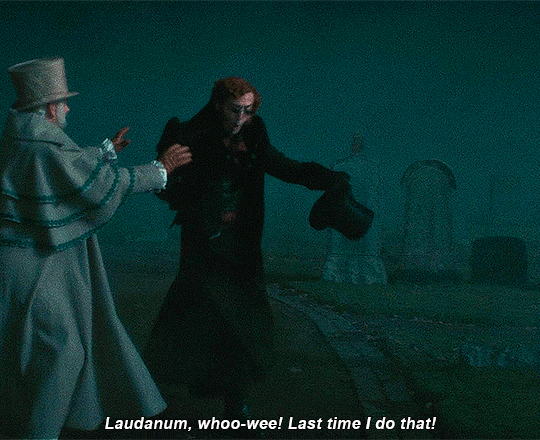
...so the morality side maybe doesn't get as much focus.
Which is a shame. Because the Edinburgh episode demonstrates perfectly the flaw in Aziraphale's understanding of the world that leads to him going to heaven.
When we start out in 1827, we are introduced to grave robbing and Aziraphale immediately decides that it is Bad (a sin). He does all he can to prevent the young woman he meets and likes from doing Bad (sinning), assumably to try to pave her way into Heaven. And Crowley tries to help her with her grave robbing, much to Aziraphale's chagrin.
Grave Robbing = Bad; Crowley supports Grave Robbing; Crowley=Bad
When they meet Mr Surgeon, and Crowley starts to ask some pointed questions meant to poke holes in Aziraphale's certainty, he flips entirely the other way, without noticing any of the other moral greyness (like the fact that Mr Surgeon would never take the risks or do the dirty work himself. Which is pretty important, since we learn in Edinburgh in the present that Mr Surgeon was so convinced of his own superiority and importance later on in his life that he started murdering people (probably "unfortunates" like Elspeth) when he couldn't get corpses fast enough).
Grave Robbing = Good; Crowley supports Grave Robbing; Crowley = Good
When he is then confronted with the idea of selling Wee Morag's body, and Crowley points out it is different when it's someone you know, Aziraphale is basically frozen in indecision. He doesn't know what the good thing is anymore.
He spouts the party line about the fact that starting off poor somehow gives Elspeth an advantage when it comes to Heaven, but is unable to explain why or how, not even to himself. And when he's put on the spot as Elspeth tries to kill herself, he doesn't have any arguments to offer.
CROWLEY: Say something! That... convinces her that poverty is ineffably wonderful and that life is worth living. Go on!
But despite all the moral ambiguity present throughout the episode, Aziraphale still sees everything as black and white. First, grave robbing is bad, then it is good. First, Crowley is bad (when he has the opposite position to Aziraphale), then he is good (when he has the same position). Aziraphale never understands Crowley's constant questions are a challenge to the very idea that there IS a 'good' in this situation. He never examines or questions the complex systems of class and sexism and capitalism which force Elspeth to this desperate recourse, or the laws which prevent Mr Surgeon from accessing bodies for research via legal means.
He doesn't see the systemic injustic. He just sees individual moral actors making either good or bad choices.
(and just to deviate slightly from the Edinburgh minisode -- while he says he understands that sometimes things are not just black or white but also grey, in 1941 - I don't actually think his grey and Crowley's grey mean the same thing. The 'greyest' thing that Aziraphale does in 1941 is help a showgirls theatre and hide information from Hell - this is not the same thing as truly seeing that some situations simply don't have a Right Thing to do, or understanding that systems shape and control individuals' decisions, so the idea that humans all have the same ability to choose Right is an illusion.
AZIRAPHALE: You know, they cannot be truly holy unless they also get the opportunity to be wicked.
So it is no wonder at all that when the Metatron offers him the opportunity to run Heaven, he doesn't see a broken institution or systemic oppression/injustice, but rather a series of bad actors preventing Heaven from achieving the Goodness it is meant to represent.
#ok that was long so I hope it made sense#good omens#Obviously the job minisode is my favourite#I mean...#bildad the shuhite#but this one is SO flipping insightful and deep and is sort of the crux of the whole thing#good omens 2#good omens meta#good omens analysis#ineffable husbands#ineffable idiots#aziraphale#crowley#aziracrow#the resurrectionist#laudanum
264 notes
·
View notes